#but more importantly i want him to grow and develop as a character
Explore tagged Tumblr posts
Text
"Small" Sonic Headcannons Part 2?(More Sonadow and what, Knuxouge too?)
. . . . . . . . . . . . . . . . .
Shadow: (talking/ranting with Sonic) "Well, with how long I was on the ARK and capsulated away for 50-some years, it feels like my body is still... adjusting."
Sonic: "Heheh, "adjusting" huh?"
Shadow has bad allergies, not often. But every once in a while he'll have a sneezing fit for a minute or two. And without fail, the start of the sneezing fit spooks Sonic/like a cat, he flinches at the first sound every time, without fail.
His allergies are bad during Autumn, not really during Spring or Summer. This is because on the ARK there was a small plant room/used for fresh air/gardening fresh plants and produce/this garden is his stash of coffee beans and his appreciation of lavender/but it was importantly for Maria and the rest of the people on the ARK who missed Earth. That plant room is either over-grown/full of coffee bean plants or lavender variants or it broke a part from the ARK and has been decaying/frozen in space/maybe separated as closed off from what's left habitable in the space station.
(I like to think that the plant room was forgotten about, only to be rediscovered as an over-grown plant room taking up a majority of sections, later found by Shadow and Sonic on their mission together, symbolizing Shadow's growth as a character, with the garden reflecting his life development)
. . . . . . . . . . . . . . . . .
Eh, anyways. Knuckles is very aware of his knuckles, other times, he is not. But during times of protecting or taking care of others, that's where he's very cautious. Mainly he's more gentle when he's taking care of someone/either picking someone up/cleaning the wounds off/bandaging up someone's injury/he's as soft and careful as he can be. He learned this from his family. He holds a bunch of medical knowledge and recently, he also learned more skills and tricks on how to take care of someone through Amy and Tails.
Amy always finds new ways to help, so she does her best to make sure her friends (and herself) are able to keep fighting, while also healing properly. She does this out of the kindness of her own heart, but she also deals with feeling like she needs to be her best/useful/tough 24/7. This really burns her out, and she may keep her pain a secret from time to time, but Amy always strives to give love and kindness through her actions, talents and words.
For Tails, he's the one who was stuck helping Sonic with his injuries. So, he knows a few DIY procedures, probably too many DIY emergency, it's concerning really. Tails unfortunately has seen too many injuries, so he's sort of "used to it"/no, numb to it. So he also carries big baggage here and there. But he copes through jokes/humor/maybe dark humor, I mean, Sonic is a part of that influence whether subconsciously or not. And Tails is not soulless, he cares massively about his found family, and can be a worry-bird, and that worry is fuel for his tinkering and creations.
Overall, Knuckles, Amy, and Tails share skills and tricks between each other, and it all helps them grow, learn, and it also helps them heal/heal the baggage and internal self standards/trauma left inside that they have yet to discover for themselves.
*COUGH* back to Knuckles, and to summarize what I'm trying to say, is that Knuckles will be gentle handling others with care. So, with Rouge/if not them bantering over the Master Emerald, he still handles her with great care, he's very tender and soft when it comes to hanging out with Rouge or his friends. Maybe a knucklehead, but a knucklehead with a big heart.
. . . . . . . . . . . . . . . . .
Knuckles likes to be the small spoon while cuddling, he's not really a spoon, he just likes the comfort of being protected. Don't chu ever think after being a protector, that all he wants is to feel protected himself? And Rouge is the one that likes to hold him close/her wings are comforting, hugging, and snug. And as they share moments together, as time flies, as memories are made, so are lessons, so for Knuckles, he learns how to be more "greedy".
Rouge: "It’s called self-care hon, and making sure he's able to treat himself to something nice. He still cares about his responsibilities. But he learns to relax a little..."
While Rouge learns to let go.
. . . . . . . . . . . . . . . . .
Rouge has a soft spot, but she keeps that somewhat hidden. She usually has her guard up (hence why she's the big spoon btw) as she always feels on edge or too stressed. She holds a lot of responsibility of her own, to her own. The stress of secret information, keeping secrets, going on top secret missions, and discovering grueling/fearful/challenging information all has its toll on her. Even if she just brushes it off, seen as calm, collected, and as a badass — still, Rouge has her hollow-hearted nights, her breakdowns, and her nightmares. It's rare but it's not like it doesn’t happen. But with the job, she keeps that minimal, the whole spiel about being able to separate her personal life with her job, she aces that, she tries for it to not get to her, and she does a thorough job for the work she does.
Rouge loves having her face held by Knuckles hands.
And Rouge very much cherishes her friends gifts, any gift really. She couldn't bare it if her gift ever got destroyed, but no one should ever hurt the gifts she cares about the most and that's people in her life.
Also Rouge has a vast spread of knowledge, especially when it comes to her treasures, to the history, the make, the material, it's use, its value, she knows basically everything if you ask her. Her knowledge also branches off into geology too, as she's used to sky, land, underground, and water missions. Maybe she does too much, who knows.
. . . . . . . . . . . . . . . . .
(Ahh that's the end of this tangent so far and there's probably more headcannons eventually, but Thank Youuuuuu, peaceeeeeee)
#writing#sonic#sonic the hedgehog#shadow the hedgehog#shadow#sth#sonic fandom#headcannons#rouge the bat#knuckles the echidna#tails the fox#amy rose#amy#knuckles#tails#Rouge#maria robotnik#sonadow#knuxouge#i mightve had a fanfiction#its in the works but#i cant keep gatekeeping my headcannons so i decided to girlboss them instead#im not really a girl tho but eh who cares have fun readinggggg
18 notes
·
View notes
Text
CARMY NEVER WANTED TO CREATE A MENU WITH SYD.
AND WHY THAT IS THE CORE THEME OF THE SHOW
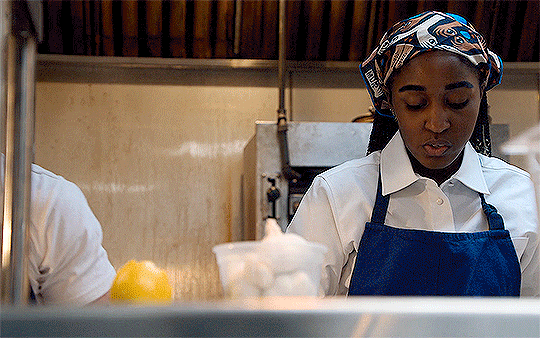
PART 1: THE LIE THAT CARMY BELIEVES
So, one of the bases of creating an efficient character arc is to give the character something they want, and something they need. In the pursuit of getting what they want, the theme of the show and obstacles will show them what they need. Most of the time, they need healing from an emotional wound that prevents them from growing into the ultimate version of themselves, capable of winning the challenges of the story. I will try to explore Carmy's wound and, more importantly, the lie that created that wound.
In 'The negative trait thesaurus" by Angela Ackerman and Becca Puglisi, it reads:
"Wounds are often kept secret from others because embedded within them is the lie-an untruth that the character believes about himself."
When I started therapy (disclaimer: this is not professional advice; I am just talking from how I interpreted all of this), I was introduced to the concept of "limiting beliefs:" lies we have told ourselves about our own nature or the nature of the world. The most difficult beliefs to leave behind are those established in our early childhoods, and we told ourselves those lies to make sense of the world, to make peace with realities we were not equipped to comprehend yet.
Some examples of lies people belive:
"I am too stupid to learn anything; my teacher said so" "It was my fault that I was molested." "I am a bad person for wanting a different life."
When people believe these lies, they will act accordingly, maybe attracting situations that hurt them but keeping the lie active in their lives. They may self-sabotage or create bonds with people who also believe the lie, even if it doesn't seem this way.
In some cases, people may develop complete personalities or behaviors to prove the lie wrong, but deep down, they still believe in the lie. Carmy falls into this last category. This is where we find the most contradictory parts of his personality, how he can act shy and insecure in some instances and appear confident and even aggressive in others.
Long post underneath.
THE RESENT OF A MOTHER:
We can only assume here because I think Storer is gonna let us know more about this soon, but I think I got an idea of this wound when I saw the only moment Carmy was alone with Donna on "Fishes."
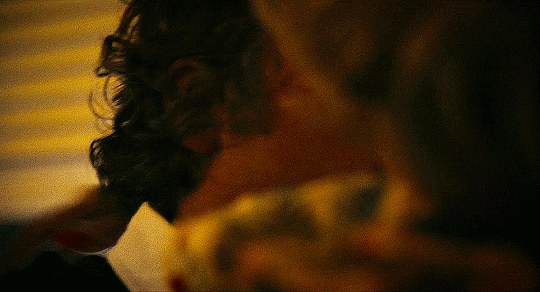
I have a lot of things to say about Donna herself, but let's begin with the obvious: the conversation in this scene had little to do with the dinner itself. This was a woman stating that she felt alone and not valued, probably due to being abandoned by her husband and having to overwork herself at the beef to support her 3 kids, all while being a single mother. We don't know if this feeling of abandonment is something she has carried since childhood, but in the state of current womanhood, it wouldn't be uncommon. The work of women (especially mothers), particularly the emotional labor, is rather invisible and not valued at all.
But again, this is something she has used as fuel to resent her kids, who, at the end of the day, didn't ask to be here. Her anger has to go somewhere since she cannot direct it toward the people that ctually caused it. To get to the point:
THE BEARZATTO SYBLING DYNAMIC
Carmy said, "You are not alone; I am here with you." (This kind of comes back to telling Syd she was not alone at the end of the season.) This scene is about a kid trying to communicate to his mother that he loves her and trying desperately to connect with her, to get her to express her affection for him as well.
It tells me that growing up, he felt like he had to "earn" her affection. Donna likes to make her kids feel guilty about her unhappiness, so the kids feel that they are constantly walking on shells because they think their mother hates them, or at least that she resents them and that it is their responsibility to fix it.
In the scene, Carmy asked,
"What is so hard, Mom?"
I think what he was actually asking is, "What is so hard about being with us, to love us? What did we do to you that made you resent us this way?" He is asking because he wants to know, to finally understand. Why do you drink, Mom? Why do you yell? Why do you say such hurtful things?
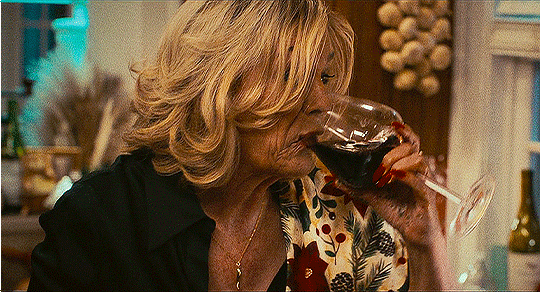
When she answers, "Nobody makes things beautiful for me," you can see in his face the disconnection. He knows he can't do anything about that.
Then, a crucial part in the scene occurs when Donna calls him "Michael, " which indicates that the only one of her children who could make her feel happy was Michael, or at least that is how the other two kids felt. You can see the hurt in Carmy's eyes in the scene because this answer dismisses his effort to connect to his mother in his own right. She asks him to just leave. He offers to wait to connect with her. Then, it comes to the most chilling moment on the scene, the "we have a problem" using his full name, with resentment in every word. She hugs him while crying, kisses him, and then slaps him.
This is rejection. There is a book called "The Five Wounds of the Soul": wich are Rejection, Abandonment, Humiliation, Betrayal, and Injustice. I think Carmy's wound is rejection, for never earning his mother's love, particularly comparing himself to Michael.
Michael took responsibility for the Beef, finally giving their mom a break. It was Michael's job to make sure everyone was having a good time, to compensate for the discomfort that caused being in Donna's presence, to make sure all of them stayed as a family, which was Donna's intention, so Michael thought he had to make that happen for her. Therefore, Michael is the only one of her kids who succeeds and makes her happy. We know Donna rejects Natalie and Carmy. About Natalie, we can write another whole essay.
THE LIE THAT CARMY BELIVES
According to this scene, I think Carmy thinks that her mother didn't love him because he is not Michael; in fact, he is the most "not like Michael" someone could be. He was shy and stuttered and didn't have friends or girlfriends, comparable to Michael's ability to control every room he was in. Carmy was sensible and no macho alfa as Michael presented himself to be. Carmy left home and the family business, and both Michael and Donna expressed that they feel like he thinks he is better than them. Michael admitted later to admiring Carmy's work in Copenhagen, but Donna never did. carmy grew up having to live with the crumbles of Donna's attention that Michael left behind, wondering every day what was so wrong with him that made her reject him, and wondering what he could do to change that.
The lie that Carmy belives, could be sumarize this way:
I need to earn people's love. I need to always go the extra mile, doing the most possible at all times to earn people's love.
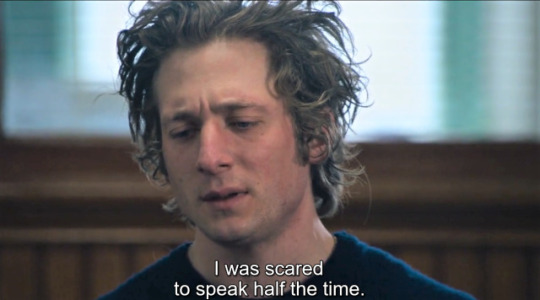
This all goes back to his trauma with Michael. It goes back to his career as a chef and how he became the best. He didn't need to succeed on a larger scale in the culinary industry to earn Michael's respect and love; he needed to be the best in the world, so he did that. He judges his own social abilities, comparing them to Miachae's. He left that promising career only because of Michae's death. He got the girlfriend Michael wanted for him (not saying it was the only reason, but it was there).
PART 2: WHAT DOES ALL OF THIS HAD TO DO WITH SYDNEY?
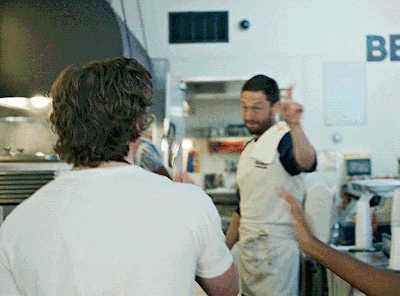
Well, what does a person who feels they always need to do the most? They do the most. I want to bring you back to the moments Carmy had to develop menu ideas with Syd on s1 and s2.
When Syd suggested items for the menu in s1, he gave her an inconclusive, not enthusiastic "maybe."
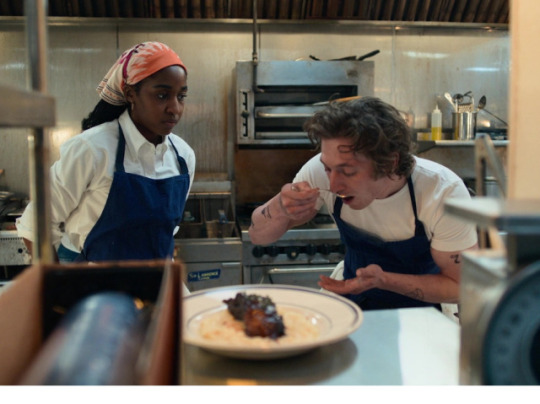
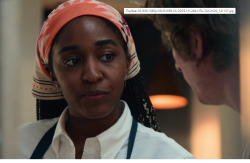
When she had to actually cook the thing for him to approve, he tried to make her feel small about it. He felt the need to remind her that she was "impatient and green," according to her previous bosses. He commented about her possibly ruining the flow by using time to cook her recipe. Yikes all around, but the core here is that he was treating her like an enemy, like competition, while she was trying to save the restaurant with what they had on hand to use the most efficient solution.
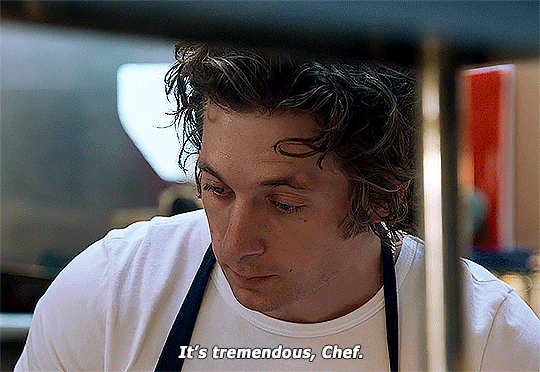
Then, when Carmy tries the dish and feels stunned by it, he has to make an ambiguous excuse on the fly and just finishes every chance of them using the recipe by saying, "is not ready yet"
And what does he do next? He goes to show the crew a recipe that is extremely complicated for the level they are operating at currently—they said so themselves. I think the recipe is a variation of Donna's butter chicken recipe. To put a nail on that coffin of his intentions to earn her love and approval at the end of it all.
But why does he do all this? Because he needs to be the hero, subconsciously, he is still that small kid begging for acceptance and love; he must go the extra mile. He cannot accept Sydney's help and partnership, because that will take away from him earning what he wants on his own merit.
In S2, he seems unenthusiastic about starting the menu in the first place. Then Claire comes along, and he tries to make it work with Syd and the menu, but I think he subconsciously thanks the universe for not having to go to his core wound. That is what self-sabotage is. That is why he bailed on the food tour with Syd, using such a stupid excuse as helping somebody else move out and never mentioning it again. He never asked her what she liked or what ideas she thought of. For most of the creative process, Syd is alone, working on her own creative crisis. The menu ends up being like two recipes they made in collaboration and then all of his family's traditional recipes. It is two of Syd's recipes and the rest of Carmy's. Then, desserts Marcus did on his own. The collaboration was superficial at best.
All of this creates the core theme of the show. The Bear was once a chaotic place (like their childhood home) that needs to evolve into an efficient, peaceful place built on love, support, and mutual collaboration like a functional family should be. Sydney is the member of this found family that forces Carmy to confront his core wound and learn he can actually be good enough while still accepting help. Therapy probably will play an important part in this theme, alongside with Carmy learning there was nothing wrong with him in the first place, that earning your parent's love is not something a kid can do.
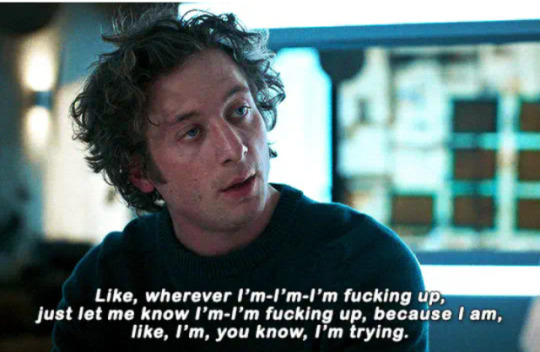
Thankyou for reading. Gif and images are not mine.
#sydcarmy#the bear meta#sydney adamu#carmy berzatto#carmen berzatto#the bear fx#the bear#sydney x carmy#carmy the bear#carmy x sydney#the bear hulu#donna berzatto#michael berzatto#natalie berzatto
336 notes
·
View notes
Text
The Agency's Older Brother: or, Ranpo's Character Development
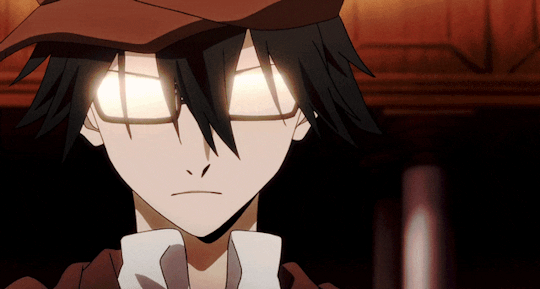
I want to talk about Ranpo and the development he goes through in the series, because for as much as Ranpo is an important member of the Agency, his story is focused on in small chunks that may not always, at first read, seem to be overly significant. In fact, Ranpo’s arc is very consistent and I’m fascinated to know where it’s building to, because he’s done a lot of growing in the series. A lot of the themes of his story are to do with responsibility and faith in others.
The Ranpo we meet at the beginning of the story is not the Ranpo we see now. The biggest change is that he’s a lot more personally involved with the struggles of the Agency members, taking it on himself to be proactive and protective, while previously he had to be pushed and bribed into helping much of the time. When did this change?
Well...


[ID: Two screenshots from a scene in Poe's introductory episode of the Bungou Stray Dogs anime. In the first screenshot, Yosano lies on the carpeted ground, an axe embedded in her chest, blood pooling around her. Ranpo is crouched beside her, supporting her shoulders with one hand and clasping her hand with the other. The second screenshot is a close up of Ranpo's distressed face. End ID.]
The thing is, it's almost easy to overlook the effect this scene had on Ranpo, because Poe’s introductory chapter/episode is such a brief one. Moreover, afterwards, Poe becomes an ally and is a bit of a silly character, so it’s easy to forget sometimes that he was a legitimate threat here - and Yosano nearly died for it. This scene was incredibly significant to Ranpo for a few notable reasons.
It’s the first time someone in the Agency was in serious trouble/died without a backup plan.
It is, unfortunately, kind of on him. (Let me be real clear here: I am not blaming Ranpo. But he probably was blaming himself and that's something to keep in mind.)
To recap: Poe pulls Ranpo into his novel out of revenge, also trapping Yosano, who went with him. Ranpo realizes that they are in a world with no abilities, and importantly, he doesn't have the glasses Fukuzawa gave him.
We know those glasses mean a lot to him. When Ranpo was at his lowest, when he was convinced the world hated him, Fukuzawa gave him those glasses and told him he had a special ability. That he had a gift that no one else did that allowed him to see the truth that no one else could. Untold Origins makes it very clear that if Fukuzawa hadn't reached out to Ranpo when he did, Ranpo may have forever been outcasted. He was a kid kept in a bubble then suddenly and rudely shoved into a world he was unprepared to cope with, where he continued to get rejected and thrown out over and over - and all this on top of the grief he felt from his parents' passing. Ranpo was bitter and terrified of people, and thought everyone was pretending to be oblivious just to hurt him. Fukuzawa saved him the only way he could, in the only way Ranpo would hear him. It's not an exaggeration to say Fukuzawa saved Ranpo's life. And, while cute, it's also telling how quickly those glasses became an intrinsic part of his identity. Only maybe twenty minutes after he first received them, he was already making little doodles of himself wearing them.
Suddenly, the glasses are gone, and Ranpo goes into a funk because he "can't activate his ability without them". Obviously, we know that isn't true, and so does Yosano. Ranpo probably, deep down, knows this too, but to admit that would be to admit the president lied to him, and to uproot the very thing that gave him the means to perceive the world in a brighter light. The reason Fukuzawa had to lie in the first place was because the truth would be to tell Ranpo that his parents lied to him, something he angrily denies could ever be the case. And now, Fukuzawa is very plainly stated to be Ranpo's adoptive father. Ranpo's parents do not lie to him. He does not want to see it - and so he doesn't. This is a recurring thing with Ranpo. For as much as he sees the truth clearly, he also chooses not to see it at times when it would be uncomfortable/go against the intuition of someone he deeply trusts and respects.
And I think it's very easy to just leave it there, and say, "Oh, Ranpo realized at the end of this chapter/episode that he didn't need the glasses, that he doesn't have an ability, and that's a key turning point" but I don't feel that's the full picture or even the focus here, especially since Ranpo still hasn't reached the point where he can properly admit it aloud, even to Yosano.
The thing is, those glasses aren't just of use to Ranpo - they have sentimental value. A heck of a lot of it, for a character who is not very sentimental. The real turning point here is that Ranpo put on Yosano's glasses in order to save her.

[ID: A screenshot of a panel from the Bungou Stray Dogs manga. Ranpo puts on a pair of glasses. His hair is blown out of his face and he wears an intense expression. End ID.]
Shortly before this, we are informed by Yosano that not only was the Agency specifically formed for Ranpo to make use of his talents, but also that it was Ranpo who invited her to join - which we later learn was a pivotal moment for her to start over after she was completely broken by her experiences in the war. And now, he is watching her bleed out because she had to take over. Because he couldn't solve it. And that, to Ranpo, is unacceptable.
But again, there's more to it. Ranpo is fundamentally a self-centered character - this is not a judgement; I actually love that about him. He's the center of the Agency, the (ostensibly) good guys of the series; a narcissistic guy with little in the way of sensitivity who wants to use his skills to help others. Not for some higher ideal, or because it's "right" necessarily, but because he's good at it, and because he's supposed to protect all the "babies" who can't solve things for themselves. I love it because it highlights a major theme of BSD, which is good as something you do rather than something you are, and also because it explains something about Ranpo himself.
See, if everyone in the world is a "baby" who needs Ranpo's assistance, then the people in the Agency are a little different. They're people hand-picked by Fukuzawa to support him, both through praise and through backup. Remember that Ranpo trusts Fukuzawa's judgement more than anything - this means that he expects the Agency members can handle themselves. So, in chapter 10, when Ranpo doesn't really care that Atsushi has been taken, citing that it's a "personal problem" and he should handle it, I really think this was some odd form of "Atsushi will be fine" and "why should I worry or do anything when I know he'll be fine". And in the past, this has been true - the Agency members always pull through. None of them, up until that point, have been in a situation that they couldn't eventually fix. Ranpo has a bubble of safety in the Agency, that basically amounts to a "villain of the week" type beat from his perspective, where troubles gets fixed up pretty quickly. All in a day's work.
But then Yosano dies in Poe's book, someone he actually had some level of responsibility for when he invited her to join his safe little circle in a world that had no place for people like them. And it's a direct result of Ranpo's refusal/inability to act.
In order to fix this, Ranpo uses Yosano's glasses. The lens he's seeing through has changed. The people in the Agency were initially "his" in that they were meant to support Ranpo, the special one "chosen" by Fukuzawa's glasses, the reason for the Agency's existence in the first place. But now the people in the Agency are "his" in that they are his to protect. He's their big brother they all look up to in a way, and as the big brother, he's got to take responsibility for their safety.
Why did this not stand out in the moment? Well, we learn something about Ranpo from Untold Origins: he's very good at pretending he's doing okay and things aren't bothering him as much as they are. He's able to hold it together up until it all comes spilling out of him during the play. Also, I do think Ranpo cares about people a good deal more than he'd have you believe. A common fanon thing about Ranpo (from what I've seen) is that he tends to forget people, which, I can see how one would come to that conclusion, but I actually think it's completely wrong. I don't think Ranpo's forgotten a single person he's accused. I don't think he's forgotten a single person he's helped.
He lied about not remembering Poe, in fact, he remembered him pretty fondly as a real challenge. He remembers the information on a person from the Special Division he was asked to look into and gave the info to Mushitarou to allow him an in. He recognizes an officer he'd helped, and it's implied he recognizes every single officer who had been present while he was working on cases in the past. Does this mean he cares about all of them? ...eh. Probably not. But it does mean that Ranpo keeps a lot of his cards close to his chest. He's disarming with his intentional childishness. And so it can be difficult for the characters and readers both to notice that events like Yosano's almost-death... actually bothered him a lot more than he let on.
Because it was his fault. Because she was his responsibility. Because he's supposed to be invincible.
And unfortunately, the story from here on out does not get any kinder to Ranpo as his safe bubble that is the Agency is repeatedly targeted in ways that are increasingly hard to repair.
Fukuzawa falls ill and nearly dies in Cannibalism arc.
A girl gets blown up and Kunikida ends up in jail because Fyodor managed to manipulate Ranpo's intel.
Mushitarou is believed to have been shot and killed trying to warn Ranpo about the Decay of Angels plan.
Taneda bleeds out from a stab wound and falls into a coma. Ranpo can do nothing but listen and cannot get him help.
The amount of times Ranpo has seen people nearly die in front of him... bro it's almost as bad as Kunikida.
Much like Kunikida having extreme faith in his lofty ideals which make him fall just that much harder when he fails to uphold them, Ranpo has practically zero self-doubt and complete and utter confidence in his abilities... so when problems arise, Ranpo is very harsh on himself. He takes the blame because he's supposed to be better than that. Because he is the one with the powerful "ability" that should never fail.
In this sense, Ranpo's position in the Agency reminds me a lot of a certain person in the Port Mafia, someone who also has a powerful skill he puts towards protecting his own, someone who also received life changing words from the boss which earned him his loyalty, and someone who would do anything to defend the only place in the world he feels secure.
I think there's definitely a reason Cannibalism arc had Ranpo and Chuuya face off, I'm just saying. Both of them ostracized and thrown out as young teens by people who should've been looking out for them. Both the instigators of that arc, proactive and desperate to protect the person they are most loyal to who changed their perspectives. They've even got the same power stance, look. :P
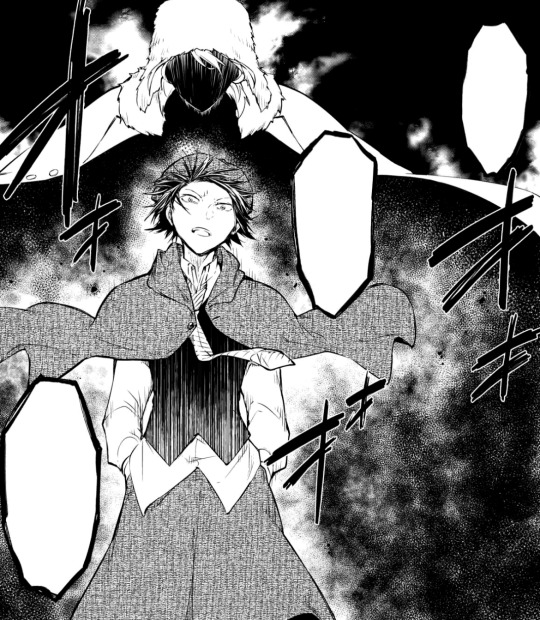
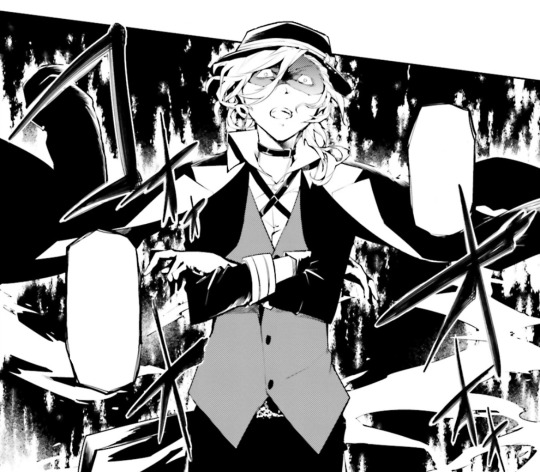
[ID: Two panels from the Bungou Stray Dogs manga. The first is a panel of Ranpo with the silhouette of Fyodor behind him. He is standing with his hands in his pockets, facing front with his head tilted back and to the left a little, a fierce expression on his face and his cloak billowing outwards. The second is a panel of Chuuya standing in a similar manner, arms crossed, facing front with a fierce expression as his coat billows out around him. End ID.]
Of course, there's more interesting comparisons and contrasts to be drawn between them, but I'm focusing on Ranpo in this analysis, so I think I've made my point. Chuuya is the Port Mafia's best martial artist. Ranpo is the Agency's strongest man. And that places a burden of responsibility on them that they both believe they must uphold. They're both ready and willing to do whatever it takes.
The thing is though, is that Ranpo doesn't actually have an ability. When up against someone like Chuuya, he is at a distinct disadvantage, and he knows it. "Regular people can't defeat ability users". But he's still going to come up with a way to do it anyways, and why?
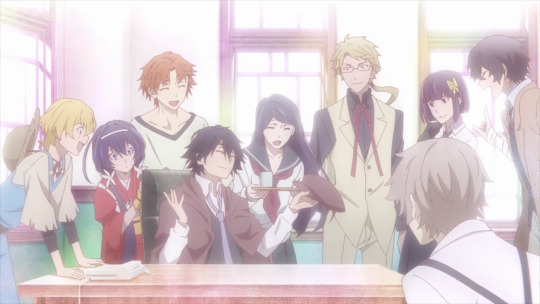
[ID: A screencap from the Bungou Stray Dogs anime. The members of the Agency all stand around Ranpo, who is seated at his desk with a smile, one hand holding his cap, the other held up in a casual gesture. The image is filtered in a soft light. End ID.]
Because his friends think he's invincible.
If Ranpo wants to maintain his safe place in a world of fear, then he has to step up to defend it, and he has to get creative about it. And that's exactly what he does. Ranpo becomes steadily more active throughout the story, which is a huge change from the start, where he had to be practically bribed to help at all. I see a lot of people point out his channeling of Fyodor's tactics to secure Kunikida's release, which is definitely a dark turn for his character, but it's not the only change.
Ranpo is now choosing to place his faith in others, the first obvious instance of this being his use of Poe's novels - which was how he defeated Chuuya. Ranpo knows that he is not going to succeed against people who drastically overpower him all alone, even if he does still take things on as personal burdens. He's also far more obvious about his protectiveness, going on the rescue himself to save the Agency members, driving a car (whereas before he needed someone to take transit with him - another indication of his increased proactivity since he's now literally driving instead of being driven), and bodily shoving Atsushi out of harm's way.
It all culminates in one of my favourite Ranpo scenes where he speaks at the conference to the police, who've worked with him before, where he asks if they will think for themselves - and tells everyone gathered there that anyone can be a detective if they think for themselves and look with their own eyes (!!!). He manages to get half the police force on his side, just through his words and his logic alone! Minoura assumes he somehow knew it would all work out, because, well, it's Ranpo. Ranpo knows everything.
But...

[ID: An image from the Bungou Stray Dogs manga. Ranpo sits in the passenger seat of a car with an honest, helpless smile. End ID.]
He reveals he didn't know if his ploy would work at all. He had to trust that it would with no solid proof. He had to trust these people would use their heads and look beyond the obvious. He respects these people enough that he thinks at least some of them will make the right call.
Fourteen year old Ranpo, bitter and estranged from other people, would never. For him to have come such a long way is testament to the security that the Agency provided him with. In a way, Fukuzawa forming the Agency allowed Ranpo to "complete" his childhood in relative safety, so that when the world became hostile once again and his family destabilized, Ranpo had matured enough to meet it and defend himself and those he has a responsibility towards head on. The Agency is his family, and Ranpo cares for them enough that he puts his faith, not just in them, but in the people they put their faith in too.

[ID: A panel from the Bungou Stray Dogs manga. Ranpo is kneeling in front of Fukuchi, who is sitting backwards on his chair to face him. End ID.]
...aaaaand then Fukuchi went and ruined it. Thanks, Fukuchi.
Ranpo again chooses to put his trust in someone without proof because Fukuzawa trusts him, only for that to have gotten thrown back into his face in the worst way possible. And it's in this regard, the trust aspect, that I think we'll see Ranpo develop as the story goes on.
Will he continue to show this tentative faith in people? Or will he begin to hyper-analyze, unwilling to trust again without proof?
If this arc gets resolved decently well, I think Ranpo will have no issue brushing this off as a one-time thing. However, if what I fear might happen does and Fukuzawa doesn't make it out of this arc... Ranpo will be destabilized.
I don't know that Ranpo would go "bad" per se. He likes the other Agency members. He cares about them - that's genuine. But if Fukuzawa dies, then Ranpo may begin to take darker actions in order to keep them safe, almost overprotective and harshly logical, with little room for blind trust or risks in the name of justice or honour. It may put him at odds with Kunikida, in that Ranpo may start to develop a strong "do what's necessary" mentality, even if that may be immoral. He may regress a little into his old trust issues.
However, I really don't think Ranpo will go too far down the path of darkness, even if the worst should happen. He's a lot tougher than he seems, and he has a good support system in the Agency. I guess it remains to be seen where Ranpo's story takes him next.
Until then...

[ID: A screencap from the Bungo Stray Dogs anime. Ranpo sits in his chair in a cuter art style, having taken a bite from the pastry he has in his left hand. End ID.]
I love one good boy. :)
#ranpo's such a good character man. there's so much i couldn't cover here but he's so so good.#but anyways. ahahahahaaaa i finished it! yesssss#sorry for the. VERY. long delay on this#i'm back baby#bsd#bsd ranpo#bsd meta#call me ace detective the way i am ace. and also a detective.#storyrambles#hope i got everything. whee.
982 notes
·
View notes
Text
On Aziraphale, Protection, and the Greater Good
Alright folks. I’ve already written quite a bit about the ways the Metatron was trying to manipulate Aziraphale here, but I wanted to give credit where credit is due and talk a little bit about how I don’t think that necessarily means it worked nearly as well as the Metatron thinks it does.
Because Aziraphale? Is not stupid. It’s one of his defining traits that though he might occasionally be slow, he has always been intelligent. He has also always been a fighter. And a bit stubborn. And though the fact he is allowed to be all that and still stay soft is one of my favorite things about him, that does not mean he is soft and soft alone.
With or without Crowley, Aziraphale has nearly always been a character who, above all else, does what’s right. This is part of what Crowley loves about him and it’s part about what we as the audience love about him too. He shelters a demon on the wall he is meant to be guarding. He gives away a sword to humans and lies to God about it directly to Her face. He struggles immensely with being asked to do anything he cannot reconcile with his morals and, even if he might fight against his impulses as to what’s right for a little bit, when push comes to shove he almost always falls on the right side of that scale. It’s important especially that this is also true of him even without Crowley in the equation.
Now, Crowley makes it much easier for him to be this person. He encourages and enables Aziraphale to be himself. He complicates and challenges Aziraphale’s worldview but in a healthy way that helps him grow and develop it, but never forces Az to be someone he isn’t. He also, most importantly, gives Aziraphale someone he understands. He is a connection. And a connection that allows Aziraphale to take his time and to make the excuses he needs to, at least for a little while. Because he understands that while Aziraphale is slow to change, he is not as resistant to it as he often reads to be - especially when he thinks that change can benefit the greater good.
Because Aziraphale fundamentally loves Earth and the people on it. And he knows beyond a shadow of a doubt that Crowley does too. Not taking an opportunity he has to help someone has never sat well with him - even if that person is a naked Gabriel showing up on his doorstep. He does not run away with Crowley in season 1 because it would have been wrong to run away when he felt he could help and the same principle applies here too with the decision he comes to about the Metatron’s offer.
While I definitely think the Metatron was using lovebombing and other manipulation techniques on Aziraphale I highly suspect he is underestimating his new Supreme Archangel. And I highly suspect that what is happening here is not Aziraphale folding back into this own cult as much as much a few other things that could be happening.
I may poke around at a few more of these later but for now I want to focus on Aziraphale lied theory laid out here by @las-lus. This whole season has focused quite a bit on Aziraphale lying/using sleight of hand for Crowley's sake. It makes sense he would do this too to protect him from the Metatron and critically I don’t think it’s an accident that the only shot we get of his conversation with the Metatron are flashbacks from Aziraphale's narrative point of view. Reading this actually changed the whole trajectory of this meta so please take a look at it if you've got the chance! I really love this theory a lot and would've slapped this all on a reblog if it wasn't so big. (Though I'll be the first to admit I'm biased to anything that lets Aziraphale do some rescuing.)
At it's core this makes this action a protective one. He is a guardian given a flaming sword by God. He was built to protect. And we see him in this role throughout the series even if it's not always in the way we expect or in the way he was necessarily built for.
I want to start before the beginning. This scene is an important one for a lot of reasons, but for the context of this the important bit is that Aziraphale is already anxious. He’s a bit starstruck and a little baffled by the strange angel he’s stumbled into chatting with, but his primary focus in the meat of this scene is actually concern for this stranger's welfare. The instant the topic turns critical he immediately starts glancing around anxiously. This scene ends with him saying, "I'd hate to see you getting into any trouble." and giving us one of the most worried expressions I've ever seen on his face.
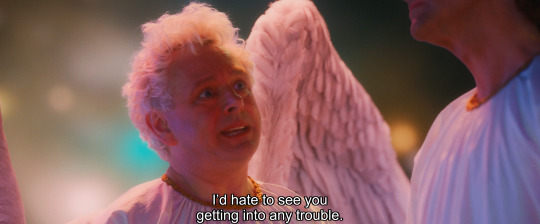
Then again at Eden, the first time we meet Aziraphale, we are shown him acting twice in a row for the sake of keeping others safe. We see him offer Crowley shelter from the storm and also give away his God given weapon to protect Adam and Eve. A lot of people tie Crowley to Eden for obvious reason but I think people often forget that, yes, without Crowley humans don't leave Eden but without Aziraphale they do not survive it.
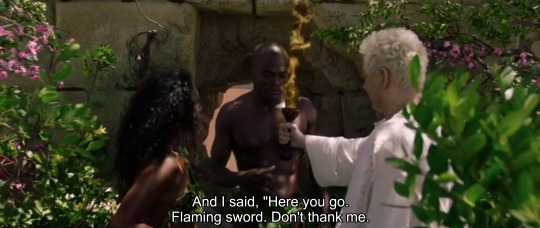
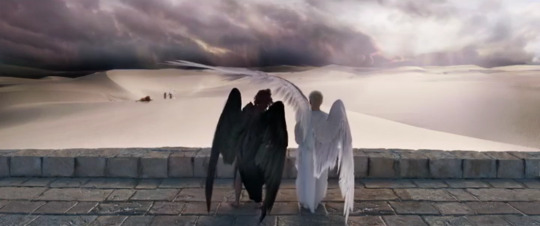
We then see him in conflict over the Flood. As far as we know he doesn't act here but he quite clearly thinks it is wrong. He's high strung and tense and his attempts to rebuke Crowley's frustration feels more like him trying to convince himself.
Now we get to Job. This minisode is so fascinating to me for a lot of reasons because through most of it, against pattern, we have Aziraphale as the driving force throughout it. First we get Aziraphale checking in with Heaven to make sure there wasn't some official solution to this. (We also get a line in there that I think says a lot about Aziraphale's priorities when he specifically draws attention to his concerns for Sitis being old enough birth that many times would be hard and risky.) Once Heaven fails him here Aziraphale is the one to reach out to Crowley and Aziraphale is the one to press for them to work together. He takes a gamble, hoping that his instinct that Crowley does not want to hurt kids is accurate, and gets up in Crowley's face to challenge him when Crowley refuses to prove him right. It is not Crowley taking the lead here, bringing Aziraphale in but rather Aziraphale trusting his owns instincts are right.

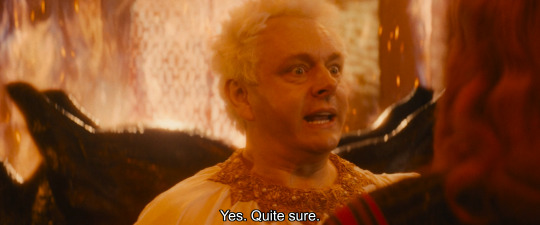
Aziraphale is also crucially the one constructing the charade Crowley plays in front of the angels as Bildad the cobbler/midwife. Aziraphale immediately and without hesitation provides Crowley with the pieces he needs to make the lie convincing enough. He tells him that what they need is an expert on human births and Crowley rolls with it and then clarifies very quickly that Gabriel witnessed Eve's birth, signaling to Crowley that mimicking that would be the play.

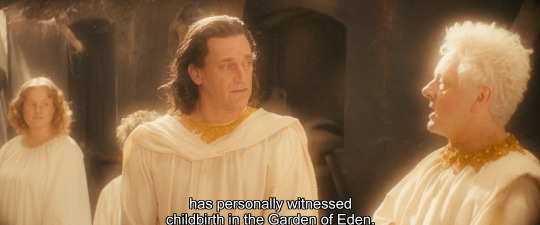
He is trying to tip the scales to get the outcome he wants - to keep this family safe - before he ever utters a lie. And then he does. He lies directly, giving his word as an angel. This is an act that eats him alive inside. He literally thinks he has fallen for this and has perfectly resigned himself as being damned to Hell for it and does it anyway. Because he knows it was right. Because he thinks a family of five he has no real connection to are worth falling to protect.

By the time we hit the Globe in 1601 Aziraphale's primary objection to their Arrangement has evolved from concern about what Head Office will think into concern specifically for Crowley's safety.
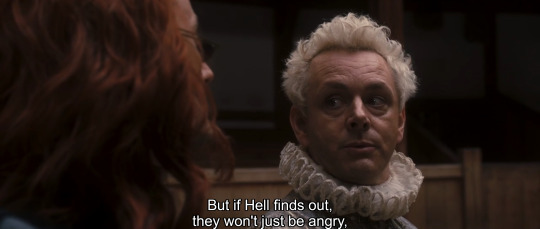

Then in 1827, even if it's in a misguided way, his concern starts out on Elspeth and her soul. He tries to protect her and very quickly changes his tune as soon as he's given proper evidence that what she was doing was net good. Again he is the one driving most of this narrative and the duo's actions forward as Crowley drifts along trying to get him to see that some actions aren't fully good or bad but can exist in a moral gray space. We also get him verbalizing his own moral code here explicitly when he wants to heal Morag.
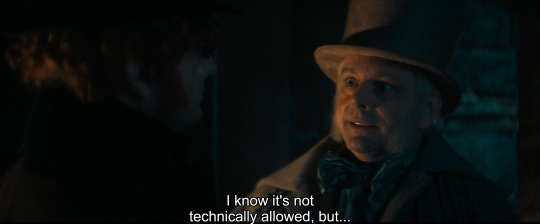
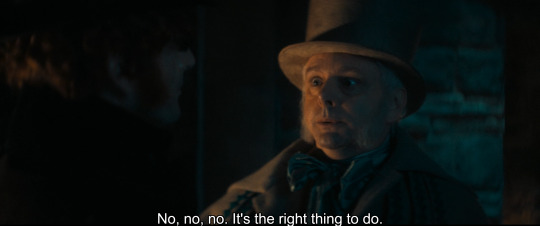
He continues to have concern for Crowley on the forefront of his mind - asking very quickly after his good deed for Elspeth if he's safe or if hell noticed and then a few years later denies Crowley holy water out of concern that it could destroy him.
In 1941 we first get him operating under cover trying to unsuccessfully lie his way into dispatching some Nazi. We then get him offering himself as a magician for Crowley's sake and using sleight of hand to keep evidence of their relationship from making its way to Hell.
In particular I want to draw attention here to the fact the episode we revisit this moment in has two very similar moments toward the beginning and end of it. This episode opens with what the episode is named for - Shax hitching a ride with Aziraphale. He's relatively amicable with her until she at one point implies harm to Crowley wondering out loud why he would risk destruction for Az. Then toward the end when Furfur enters the dressing room, Aziraphale is pleasant and kind until the moment it becomes clear Crowley is being threatened. In both cases his expression turns more neutral and his body language becomes more focused and serious. He is ready to protect at all costs and is done being polite to these people who threaten his demon.


From there we go to 1976. Here as he hears about Crowley's holy water heist, he makes a choice. Even though he does not want Crowley having this weapon at all and tells Crowley as much that that position hasn't changed he realizes how dangerous trying to steal it could be. So he decides to make it as safe as he can in the circumstance, putting aside his own wants and feelings for the sake of minimizing even potential harms.
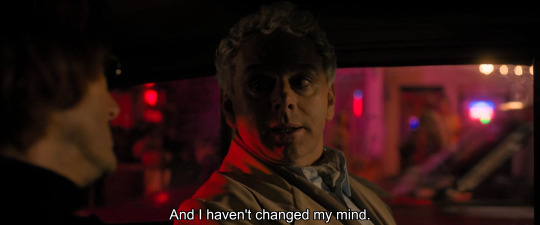
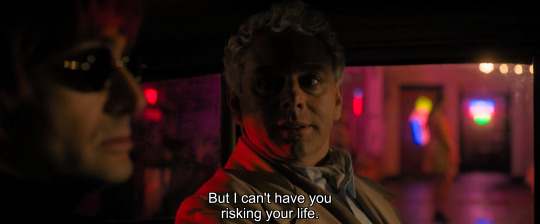
Even good old 'you go too fast for me' is a form of protection here. Even if it hurts and even if it's not want they want they need at least one of them to pump the breaks to make sure they are not discovered.
Then the world nearly ends. I won't examine what happens there too closely but I think we can all agree Aziraphale was willing to do quite a lot to insure the world and Crowley were safe once Crowley gets him on board with raising Warlock. Though I do want to note I don't think it's an accident that a lot of what Aziraphale says to Crowley at the end of six has echos of the bandstand - the last event Aziraphale has to reference that he knew would make Crowley go away.




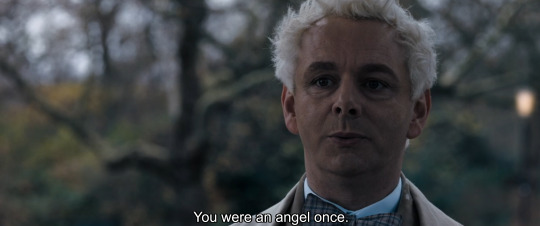
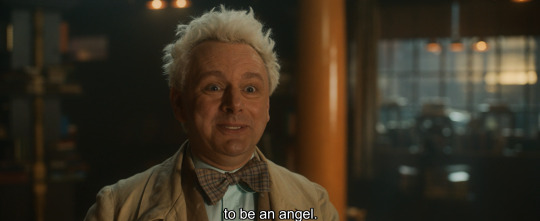
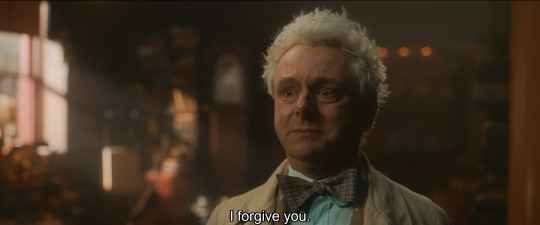

A lot of the core of the current season is built around all sorts of protective Aziraphale actions. The flashbacks all gesture at it in some capacity, and anther notable one is him sacrificing books both as weaponry and to make the ball happen. He has committed to securing their safety before a single demon even shows up looking for Gabriel. We also get him willingly risking war to defend the people in his shop. Episode six in particular shows us a lot of Aziraphale in this mode, which he's pretty much locked into from the moment the demons arrive, Whether it's protecting Gabriel, Nina and Maggie, or at one point putting his body between the demons and a whole crowd of people including Crowley.

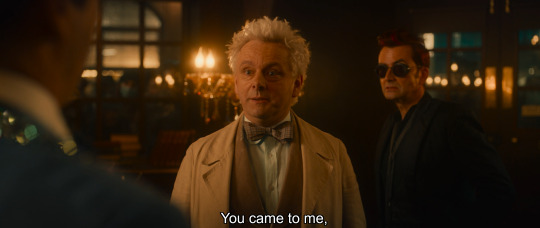
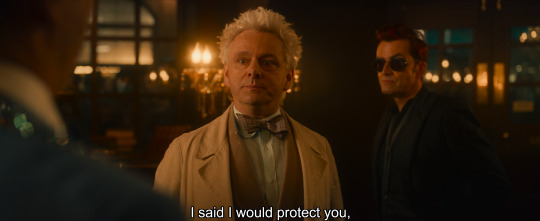

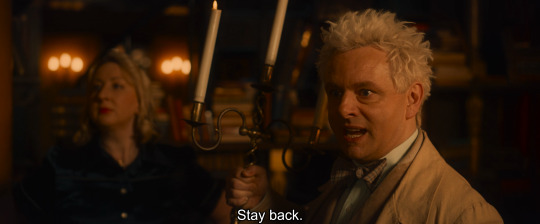
This season is a season that emphasizes that Aziraphale is a liar. It is one that draws attention to him pulling tricks and on him learning to do that for the greater good. It it about him learning that sometimes the choices we make are often more morally gray than we would like. And most importantly it is about Aziraphale believing this world and the people in it are worth protecting.
And who does he want to keep safe more than anyone? Who did he fight to share his life with? It makes sense to me that he would do this for Crowley. It's perfectly in character and gives Aziraphale the due credit I think a lot of theories lack. Because, to me, Aziraphale isn't the one that walks away from Omelas, Aziraphale is the child who would willfully sacrifice himself to keep the people he loves safe.
1K notes
·
View notes
Text



Numen, "Love" of Jormag, the scion of Ice. Also known as "The One Who Opens the Door". (He/They)
I don't have their norn design (nor name) yet, but imagine the most innocent blonde boy of short stature with striking blue eyes and the softest smile :) Character backstory below cut! Pspspspsing at all angst hound Commanders out there!!
An orphan rescued from an abandoned village in the Deep Shiverpeaks. Though losing entire settlements to the savage Sons of Svanir was a common occurence, there were no signs of attack, no blood, no slaughter, it just seemed like the inhabitants simply got up and left merely moments before a norn patrol arrived to rest at the local inn. Doors and windows were open, rendering interiors freezing.
The child, naturally, had no known name and was of an unsettlingly pale complexion. He was taken in by the warriors and brought to Hoelbrak, where he grew up more or less normally.
Though he did fit in, he was frail and unfit to pursue his legend, or even be a hunter, despite clearly wanting to. Instead, he was an elementalist with the rare affinity for ice, something the elders theorized to be a result of the near death experience in his infancy.
The boy joins the Commander's party relatively early on, perhaps as an adoptive younger sibling/childhood friend to Braham, and makes himself useful with his unique magic. It's during S3 that things begin to get weird, with Jormag stirring from slumber leading the young man to run off as though following a silent call, before eventually returning seemingly with no memory of whatever happened.
During IBS, he starts acting even weirder, with people mysteriously going missing when left alone with him, as though spirited away. The Commander and Braham confront him, wishing to get to the bottom of what's happening to their friend, only for the reveal to happen.
He was never a norn, but the shapeshifter Numen, the One Who Opens the Door. Every cycle this happens, the scion's memory is wiped and they're found and taken in by the living races, they come to be loved, grow into an identity, only for that love to become everyone's downfall. In Jormag's own words,
"You'll sleep now, and be their child. But you will always wake, and be my child first."

The character could go a traditional villainous betrayal route or (maybe preferably) an "I never wanted this but I can't refuse my creator" tragic route. Two personalities fighting inside, the servant of the Ice Dragon and the personality developed during his time in Hoelbrak and then, with the party. But most importantly, the Commander has to make a choice between saving many people via slaying Numen during a Dragon Response mission or trying to save him, in whatever way they might devise.
Naturally, if they do slay him, Jormag's only got one thing to say: "I see you're more than willing to discard love... if it only aligns with your heroic ideals. Weighing lives on a scale when patience cannot be afforded. Well, no matter. Raven taught you well. I wonder just how easily you could do the same to Aurene?"
"Tell me, o Commander of Tyria, what's worth more to you? The world, or her?"
#gw2#guild wars 2#jormag#gw2 jormag#dragon scion#gw2 dragon scion#scion of jormag#gw2 oc#dragon#quen's ocs#Numen#my art#dragon art#the fullbody is a rough WIP and may change but the general body plan stays! imagine a mix of barioth and jabberwocky from the 2010 AiW movi#If you want pleeease do tell me how your Comm would handle this plot :)))#About the Scion
88 notes
·
View notes
Text
Byakuya is stronger than me because if my baby genius son senku refused any of my loving parent hug or kissie i would literally cry in my bed after pretending to go take a nap
This above was the original post, but actually i decided to make it into a more developped observation of Byakuya and Senku relationship and why they have the best anime father-son bond ever.
I would like to remind that everything that is said is about two characters that have a completely different personality and way of handling things, and so the argument "they both love science" isn't enough to explain why they have a better bond than any other anime father-son, and why Byakuya is best father.
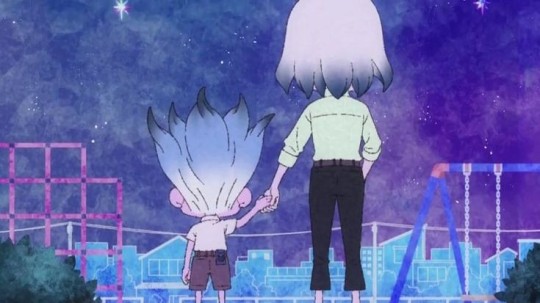
First of all and the one everyone knows, Byakuya always gave his support and sacrified for Senku. He takes his parent responsabilities to heart and never questions his son's path.
He knows Senku likes to make things by himself, that he enjoys learning by tests and errors, and he never tried to stop him. On the contrary, he sold his car to have money to prepare a whole laboratory for Senku. Of course not any family could afford selling their car, or lending freely all money amouts, but it's not a meaningless decision either. A whole laboratory, for his son, because he knew Senku wants to do it himself and Byakuya would rather let go of things he likes than seeing Senku being stopped in his passion.
After the first pretrification, Byakuya first goal was Senku (normal for a parent lol), but then his goal changed to helping Senku in every way possible for when he wakes up. Something that no one could be sure to happen.
He knows he'll die long before it could happens, so he created a village just so Senku could have people to help him. A whole VILLAGE that he made surviving with his stories of knowledge for THOUSANDS of years so Senku wouldn't be alone in his quest of reviving everyone and would get help. Oh and also made the people of the village transmit for generations a message for his son. All this time. That's crazy how he never gave up. He also spent the rest of his life collecting platinium, until he died there. He sacrified his health and life because that's his genius son and that's enough reasons for him. (It's actually crazy if you rewatch the anime you'll see everything he does is for his son)
Next point is the affection showed between them. Senku is Byakuya joy and pride, he never stopped telling it in his way to absolutely everyone. Senku is aware of the love Byakuya has for him, which is very important for a child growing up to know you have your dear ones that care and will care whatever happens.
He doesn't belittle his father emotions at all (Senku isn't the kind to not care about people feelings btw but that's another story). When the Jaxa was looking for astronauts again, he made a swimming costume because he knows his father isn't doing great, but more importantly he did it because he knew how much he was waiting for the opportunity to show up and how much it would mean to him to pass the test.
All this brings me to the next point, the unbreakable trust between them. If he wasted his life with labor work at collecting ore, if he made a village when he just could have waited death, if he made a recording of the last song of humanity, it was all because he trusted Senku to find it. He trusted his capacities, he trusted his hardworking mind, he trusted his cartesian brain to not give up. He based everything of the small chance that he'll wake up, but he knew that if he ever does, he would 100% find the remedy to the petrification.
And on Senku's side, he trusted Byakuya way of helping him. Of course he couldn't guess what he did for him at first. But the second he understood Byakuya came back alive from space and did something for him, he trusted that Byakuya wouldn't give up on him and would try his best.
Neither of them ever put in question their bond, they are father and son, whatever people say, whatever if they aren't blood-related, they are linked by the love and trust they hold for each other. They know and they agree to it completely.
What makes their relationship interesting is that not any of this is said directly/openly, because firstly they doesn't need to (with all that they did for each other) and also because Senku doesn't communicate this way at all. Actually Byakuya and Senku have a completely different love language : Byakuya is very open and outspoken, but Senku is the opposite, using actions as a way to express love. So Byakuya adapted and did things that shows to his son that he cares, like the laboratory or the years of work post petrification for exemple. He almost expressed his love on the song record, but he didn't because he knows Senku knows. They just know, they trust and they believe.
All that explain why they have the best relationship. Also this would explain why everyone seems attracted to Senku's science. There is passion in it. There is the love and care, there is the enjoyement of showing to others how science is cool. No wonder, that's what Byakuya did to Senku his whole life. Byakuya didn't teach him science, he taught him passion and perseverance.
Anyway goodnight and sorry for the grammar mistakes i'm not english and it's past midnight, i hope it makes sense
143 notes
·
View notes
Text
I know everyone has their different takes on Astarion’s character, and what they think his story should look like/what he would or wouldn’t do with his life after the events of the game, and I think they’re all valid. And not everyone is going to like your read or what you want him to pursue or be like after all is said and done. And there’s nothing wrong with that! Could you imagine how boring things would be if we all agreed? I personally love seeing the diversity of takes.
That being said, I am very much a fan of the idea of non-Ascended Astarion starting a family after everything, just me personally. Now, I know that’s a whole can of worms for people who don’t like that concept or who don’t like the idea of kids/pregnancy in their fiction. That’s completely fine. Funnily enough, I have no desire to have my own kids, but I love exploring that sort of lifestyle and the dynamic it creates when it comes to my characters in my own writing.
And I do think he wants kids, in my world state (to borrow a Dragon Age term), anyway.
I always go back to Astarion’s confession, when he says he wants “something real.” All those years where sex and love were nothing but a performance to seduce people and lure them to what he thought was their death. And now, with Tav/Durge, he wants the real thing. He wants to love and be loved.
He says he doesn’t know what “real” looks like anymore, which means he’s got to figure it out. And we know he isn’t much for plans, so that means a lot of what he learns is learned as he goes. That must extend to learning what he wants, too.
“I Want to Live” is the song that is consistently played in relation to his character development (despite being the players song.) Want. For all of those years, he was told by Cazador that he and his fellow spawn were a family. If he doesn’t ascend, then what he desires, and discovering what he wants, and taking what was false for so long and learning what the real version of it looks like to him all come together to make it easy for me to see him enjoying fatherhood.
He wouldn’t be Astarion without that prickly personality of his, but as his relationship with Tav/Durge progresses, you get to see the softness and sweetness he has in him, too. And I believe he really does mean it when he says he wants to protect them. He does genuinely care, as sarcastic and standoffish as he can be. That’s part of his personality and his character arc.
Now, do I think he likes all kids? Not at all. I think he likes certain kids, and for certain reasons. He may not encourage taking in Yenna, but he does insist on saving her from Orin. He seems to have a high opinion of Arabella. It depends on the kid. In a strange way, I think his own personhood being taken from him has made him view kids as more individual than most people tend to.
And I think he would adore his own kids because of who they are. They’re proof of how far he’s come, they’re proof that he’s alive and he’s living and that Cazador didn’t win in the end. He’s here. He won. He’s growing past everything.
And, most importantly: they’re his kid(s.)
Do I think he’s ever considered having children prior to having one, even before he was turned? I doubt it, honestly. But especially prior to his vampirism, I don’t think it matters whether he did or not. He can’t remember what color his eyes were, let alone what he wanted or who he was. And it doesn’t matter, he makes that much clear. He isn’t that person anymore, and he won’t ever get to be them again. So whether he had thought about children specifically or not, whether he wanted them or not, I don’t think that matters to him anymore.
He never saw himself as a hero, either, but he’s a Hero of Baldur’s Gate now. He cares. In his own way. And he defines and does things his own way in his life now. He’s still not your stereotypical hero, but he’s also no longer your stereotypical vampire. He wouldn’t be Astarion if he was easy to define. And after everything, he is still Astarion. He’s complex, and he can be quite contradictory and inconsistent. That’s both part of his personality and a result of the 200 years of trauma he survived, I think.
And again, he’s also not one for plans. I don’t think he considers being a father until Tav/Durge is telling him that he’s going to be one. And that kind of life-changing news can rattle even the people who have planned for it and wanted it their whole lives. Sure, I think it takes some getting used to, and I’m sure there are complex feelings that come with it. Rediscovering yourself and building a life are never easy. Living isn’t easy.
But this is another part of the life he’s living—really living. This isn’t the mockery Cazador forced the spawn to play pretend in, it’s a real family, his family. And I think that means everything to the person he chooses to be now.
#I just have a lot of feelings about Dadstarion#I’m so sorry this is such a mess but I just wanted to talk about him#Astarion#Dadstarion#Papastarion#character study#if you squint
199 notes
·
View notes
Text
The more I read the more I don’t understand the absolutely homophobic coded hate for The Sun and the Star. Nico literally shares a homophobic experience he experienced in the 40s that shaped the way he viewed himself, reflects on it, and then comes to the conclusion that’s what made him react to Cupid so badly, and THIS is something to hate??? Nico, growing, learning to share, learning to not impose isolation on himself, learning to feel his emotions and let them out, to be there for people, to miss Percy and Hazel and Jason, actually developing, and people are like “ugh so boring and unrealistic, they ruined my fav character”
Well, sorry he’s not the miserable little edgelord you all desperately want him to be. Sorry that Will actually has some very understandable flaws, sorry that Percabeth aren’t perfect, sorry that you’d read book about the experience of coming out for an Italian raised boy from the 1930s and think it’s boring, sorry that you’d read about the trauma of his Tartarus experience from HoH and go “OVERDONE”!!! This book does have flaws but it is not Nico and Will.
Every single interaction feels meaningful, the focus on emotion, growth, light, happiness, connection, love, friendship, and more is what is quintessential PJO to me. It’s not full of adventure after adventure and that’s perfectly fine to me. They’re navigating an emotional minefield. How the fuck can this fandom sit here and complain about the lack of emotional depth in Blood of Olympus and then when they do get it they’re like, “oh no no no this is the WRONG kind, I want him to stay miserable, I actually don’t want to read about his sorrow from his POV, I don’t want Nico to be MATURING” GROW UP?
Nothing about Solangelo so far feels OOC to me, and every time they do it’s actually even pointed out to us that it IS ooc, and we get to see how they feel about it. This is exactly what I expect from canonical middle school sunshine/darkness tropes.
Also, this is VERY IMPORTANT so pay fucking attention. THIS. IS. NOT. A. MAIN. PLOT. BOOK. IT DOESNT HAVE TO BE BREAKNECK PACING. If this was an anime, this would be a sweet little OVA arc. This is a side story, just the same way the Percy/Thalia/Nico story was. It’s a companion book about two side characters. Why are your expectations as high as a main series book? It’s a NICO AND WILL book, it’s not anything more or less. Another thing to remember? Canonically this is meant to be the year 2011. The RRverse is very anachronistic where current year elements feature in a timeline where it shouldn’t, but EVEN SO, it still feels at best 2015. More importantly? It’s only been a year since Cupid. A singular YEAR. For reference the pandemic started 3 whole years ago.
I can’t stand fans sometimes, you’ll jump on any bandwagon of hate without exercising a single shred of critical thinking or nuance, and then conveniently forget a whole bunch of things that are GOOD for the minor flaws this book has. This isn’t a 10/10 book, it’s probably a solid 7.5!!! Stop treating it as if it’s 3/10. And I stand by what I said before. We need more middle grade LGBT lit! Is this the BEST out there? No. Is this however bad? No. And before you guys come for me without having a molecule of reading comprehension, it’s OKAY to not like this book. It’s not okay however to make sweeping statements of hate as if everyone who enjoys this book is a blithering idiot.
532 notes
·
View notes
Text
Okay. My thoughts on the Our Flag Means Death finale. Obviously I'm not very happy with the ending, though I'm also not as upset as some people are. I would say I'm discontent. Unsatisfied. Too aware of how it could have been improved, and a bit bitter that we didn't get a better version, but I also don't hate what we did get.
I know a lot of meta has attributed the problems to a shorter season, and absolutely I would have loved to get 10 episodes instead. I would have loved 22 episodes! Why don't we do that anymore? But I don't think the 8 episode length was the ultimate problem. A) The showrunner and writers knew they had only 8 episodes, so they needed to choose a story that fit into that length, but even more importantly, B) my problem is not that they had too much story for too little time, but actually that they had plenty of time and chose to fill it with too little story.
As I've sat with it over the last few days and thought more about the season's arc, it feels to me like we got eight episodes of filler. Filler episodes can be great! Filler episodes can have some of the funniest lines, the greatest scenes, the most intriguing ideas. But filler episodes do not progress character arcs or major themes, and that's exactly the problem this season had.
The only characters who got arcs this season are Izzy, and to a lesser and more rushed extent, Lucius. Which sure is a choice.
Ed and Stede and their relationship did not meaningfully change from S1. (Okay, yes, they had sex, they said I Love You – but these are external changes, not internal. They don't represent character growth. Stede realized he loved Ed and was telling everyone back in 1x10. Ed clearly would have slept with him in S1 if they'd had a little more time.) Ed and Stede in 2x08 are not different from who they are in 2x01. If Ed had asked Stede to be innkeepers in 2x01, does anyone think Stede wouldn't have immediately agreed? One of the big moments in 2x08 is Ed reading a letter that Stede wrote in 2x01! Stede's exact words from the very beginning of the season! What better way to underline that none of the subsequent seven episodes had important growth or changes?
Another one of 2x08's big shippy moments is Ed and Stede running to each other across a beach – deliberately paralleling the dream Stede had in 2x01. What are we supposed to take from this parallel? My original thought was that we're supposed to see how different the real version is from the dream, but there's honestly not many differences. Neither one has a beard, now? The dream mocked how Stede knew they needed to have a conversation about their relationship that he wanted to avoid, but they don't have a conversation in the "real" version either. They exchange about two sentences (which includes Ed's I Love You, yes, which is a big deal but still isn't a conversation) and then they charge right back into the fight, without discussing anything like Ed abruptly dumping Stede to go be a fisherman, Stede killing Ned Low when Ed asked him not to, their differences of opinion on being pirates, if having sex was a mistake or if that's only a thing Ed said because he was panicking, etc etc. They have just as many issues to address as they did in the dream, but just like the dream they act like everything is magically okay without talking about it!
So I think we're meant to take the beach-run parallels as "here's what Stede's been wanting, and after waiting for so long he finally gets it". Which is fine, a very sweet take-away for a finale. But it underlines what I'm saying is the problem of the season: Stede has just been waiting for eight episodes for his dream to come true. Not changing. Not growing. Not doing anything to bring the dream about, other than trying to get himself and Ed into the same physical location. Just... waiting.
This is an extra surprising development, because the show was really good at giving Ed and Stede character arcs in S1! Ed and Stede in 1x10 are significantly different than they were in their first introductions. Also, just to preempt some criticism, by 'progressing' I do not mean 'wrap up literally every loose end and make a firm final ending' – S1's finale is an excellent example of both moving the characters forward and leaving a ton of room for future stories. I wasn't expecting for 2x08 to show us a Stede and Ed who were perfectly on the same page and would never again have a problem. I was expecting them to be somewhat different than they were in 2x01, and I just don't see that.
Instead of arcs, we got little pieces of single-episode growth here and there that never added up to an overall whole. The season brought up a ton of potential arcs for Ed – violence, piracy, guilt, suicide, daddy issues, self-loathing, apologies, redemption, his tendency to idealize escaping into a different life – but didn't do anything with any of these options. Stede had nothing resembling a season arc at all.
Stede works to improve as a captain! Stede kills someone and has regrets! Stede confronts Ed's dark side! <- All potential arcs, but none of which lasted for more than an episode or had consequences. We don't even know what the ending means for Stede: does he want to be an innkeeper because he failed as a pirate in 2x07? Because piracy was always just a displaced search for love, and now that he has love, he doesn't need piracy? What does the crew of the Revenge leaving mean to him? Stede's understanding of their new arrangement literally happens off-screen and we're left to fumble at guesses for its significance to him as an individual.
Ed and Stede's last big conversation in the season is their break-up fight in 2x07, which is a shocking way to send off your main couple in a rom-com. Yes, there's the I Love You on the beach (again: two sentences) and the brief 'let's try to be innkeepers' conversation at the very end, but that's it for them in 2x08, except for their inclusion in some brief large group conversations about their fighting skills and the plan for escaping the British. How can you end your rom-com with the main couple exchanging only a paragraph's worth of dialogue in the finale? None of the stuff was brought up in the fishing fight in 2x07 is ever addressed at all!
Again, I don't think this is solely a matter of time crunch. Instead of using the eight episodes to progress the two main characters, we got a bunch of filler episodes that used the time in amusing side tangents instead of forward progress. I don't think that's the inevitable result of having to work with eight episodes.
Look, I can come up with a better Ed/Stede relationship arc without needing more episodes, and despite only thinking about this for a couple days and not having an entire writing room to work with:
(Note: this only addresses the Ed/Stede relationship. It doesn't fix Stede completely lacking an independent character arc and Ed having about ten thousand of them, none of which went anywhere.)
In 2x05 to 2x07, I would make Ed's motivations in their relationship very clearly that he's pushing Stede away so he doesn't get hurt again. Basically play up Ed's comment about "I was all in" in 2x04, and make him determined not to get 'all in' this time around. This aligns the "let's take it slow" conversation in 2x05, the "sex was a mistake" in 2x06, and Ed running away to be a fisherman in 2x07 into a single arc. He wants Stede, but he's afraid of what that wanting will do to him. He's trying to find a way to have a relationship without making himself vulnerable. He keeps pushing off commitment and openness.
Then, in 2x08, I'd make it more explicit that Ed thinks/fears Stede is dead when he sees the pirate ships burning. I think it's subtext in the episode as-is, but give him a line or two to make it really clear. Ed and Stede still see each other on the beach, have their dramatic run to each other, and Ed says, "I love you". Now this moment is Ed acknowledging his love, exactly what he's been avoiding for the last three episodes.
Near the end of the episode, Ed and Stede have a conversation where Ed says something like, "I didn't want to get hurt again, I was afraid of the risk of falling in love and you leaving again, but thinking you were dead made me realize that never loving you would be worse" (but better written, ha, this is a tumblr post that's already too long). (Also possibly you could tie in Izzy's death here to underline both Ed and Stede not wanting to lose another person they care about, if we must have that plot point for some reason.) We actually get to see Ed asking Stede to come be innkeepers with him, paralleling asking him to run away to China (and paralleling NOT asking Stede to a fisherman), Stede voices some of his worries (paralleling him keeping them inside in 1x09, but also giving him a chance to explain what piracy and love mean to him and why he'd give up one for the other), but ultimately they agree that they at least want to try.
This both puts them into a much clearer place for a happy ending, has clear growth from S1 and the beginning of this season, but also leaves open a ton of room for S3, because welp, it turns out trying to have a relationship entails all sorts of problems! Especially with these two. It also would make me feel like they'd at least addressed some of the issues between them.
Right now I feel like S3 will have to spend at least the first few episodes running through exactly the same "don't talk – break up – get back together dramatically" arc that Stede and Ed have already done twice but have never discussed and never learned from. I liked it, but I don't need to see it yet again. That will – ironically – feel like yet more wasted time, more episodes that are just churning through beats without moving the characters forward. I wanted them to have new, different fights in S3, but now I don't even feel like they've made enough progress to have a fresh set of problems.
272 notes
·
View notes
Text
Continuing the JJK posting: Gojo is such a mystifying character.
Action show where swinging out the gate you introduce a character who is so incredibly powerful you then have to, before every fight, establish why Gojo can't just show up and fix the problem in seconds. His existence weakens the stakes of everything. The rest of the show you are backflipping ridding yourself of him. He jobs two major bad guys off the gate and every subsequent extensive fight with them feels like cleaning up his leftovers. Put him in a box, he's ruining the game balance. So absolutely broken. As a writer it makes your job so difficult, but it's also the entire point of him. "Hey I want to write the single most badass character of all time who can do the most insane shit but I will also engage with that", rock on king.
I think he's most interesting when understood as somebody who is fundamentally alien and removed from ordinary human thought processes. In his world there is absolutely nothing he cannot do, and the thought 'maybe I can't do something' just doesn't occur to him. He is capable of doing whatever he wants and of killing anybody who tries to stop him from doing what he wants. If he is not doing something, it is because he does not want to do it. If he wants to do something (kill all of his superiors) and he's not doing it, it's because he doesn't think it's the most effective route towards what he has decided to do. I think this informs the majority of his actions (and, importantly, what he doesn't do)(murder). I think he's reasoned out that you should have a general reason to do things, and it feels like sheer luck that he places value and meaning in human life, and as such you shouldn't kill them without a strong reason. Watching the flashback arc, if I hadn't seen a) JJK and b) Naruto and you asked me which shitty teen became a law abiding school teacher and which became a mass murderer I would have guessed the wrong ones.
Anyway, the way I like to think of him, he's a raging narcissist with a god complex to match. Horrifically, he's actually a good teacher, but he is also a teacher as an ego/'raising my child army' thing. He would be the kind of mother who is a good mother but lowkey had kids also as an ego/unconditional love/lots of attention/'surely my child will worship me' thing. Gets randomly into new hobbies, obsesses over them, gorges himself on the novelty factor, before dropping them in a week once he gets too good at them. Rinse and repeat. The only hobby that does not eventually grow boring is annoying people, so it's his only hobby. Geto told him age 15 that he'll never have any friends if he keeps on casually reminding people that they live on his sufferance, so he developed another back-up hobby more conducive for friendship of helping people forget that they live on his sufferance. This has convinced him that he's a god of subterfuge, intrigue, and trickery. Does eat women out, but is convinced that this makes him God's gift to women, and is actually pretty terrible in bed because his partner's desires never even occur to him. Is convinced he's as good at sex as he is everything else. Sex is actually the one thing he's bad at, but he's not ready to hear that.
In S1 he overall left me with the general impression that his entire idea of how high school worked was sourced from anime, and as such decided that being a teacher involved nothing but field trips, sports games, beach episodes, sports festivals, etc. Did not know how the classroom component worked so he skips it. Jossed, but also left me convinced that it would be very funny if he was an immortal 150-whatever years old and had founded the high school himself out of, you guessed it, an ego thing, and never once properly learned how high schools worked and just arbitrarily made his own aging students the new principals so he could continue engaging in training the kids who are too Misfit (TM) to get apprenticeships and living his fun slice of life anime life and raising a child army of kids who will worship him any day now. Annnyyyy day now. Any day now.
#jujutsu kaisen#jjk#gojo satoru#jjk gojo#jujutsu gojo#my posts#this makes it sound as if i hate him and think he's a terrible person#to be clear i think he's great and i just find characters most interesting when theyre terrible#watching the show i was just generally waiting for it to follow up on his established teenage homicidality#explain why and when he stopped being two thin hairs from murdering everyone he disliked#but they didn't so i have to suppose he's just chilled out a little#fic authors arent going far enough with him. i dont think his brain should resemble a human persons.#the 'i am above humanity' thing shouldn't be an angst thing it should be a factor of his psychology#thank you dora for stealth co-writing this post love you#might write the immortal thing might not. writing such a weird POV does sound fun to me though; id like to do it#itll either be very easy or very very hard#it feels like genuine straight-up luck that gojo's an active good guy. liike what.
76 notes
·
View notes
Note
I've been stumped trying to figure out how to write my MC realizing and overcoming his identity issues.
My MC comes from a place where he had to constantly hide his true self and intentions to survive. He was forced to play a pawn for many people and learned how to read in between lines just to live another day. He then travels to another universe by accident, and meets himself. But it's a version of him who's completely unbothered by the tragedies and situations that he went through. He grows as a person with his innocent help.
My goal is to portray a feeling of hopelessness for himself as he questions who he is. I want him to start rediscovering his hobbies, learning how to set goals and what he actually wants, but i struggle with showing the symptoms of his identity crisis and ways to overcome it.
Thank you in advance for answering !
There’s quite a bit to unpack from this question, but I ultimately read it as asking for help to portray a character’s crisis and development through his journey of growth.
I have bad news, good news, and better news for this.
The bad news is, if you don’t know how to write this for your character, you don’t know your character well enough. Yet.
But based on the details you do have, the good news is you already have a solid start to resolving the issue with character development. You have a backstory portraying who he is at the start of the story, as well as the means of a positive character arc for your character to experience.
The better news: While writing, your main character is the heart of your story; and learning more about him not only helps develop more details, but it also involves looking into other areas of your writing that can improve your story, too. Thus accomplishing multiple things at once!
Ultimately, resolving your situation boils down to three things:
Confirming your story’s theme and its “why”
Confirming your character’s arc
Confirming your character’s GMC (goals, motivation, and conflict)
Because, in order to know how to portray hopelessness for your character during his character arc, we need full details of who he is before the arc, after the arc, and–most importantly–what his hopes and fears are in that journey.
My goal is to make this process streamlined, but still give you space to explore. Character development can get real deep real fast, so watch for drowning in the details. We just need to find and solidify the purpose of the character and his journey for the sake of knowing how to find his version of hopelessness.
Starting with the first step!
Confirming your story’s theme and its “why”
In a previous post I wrote, about getting started with writing, I mentioned how to determine your “why” behind writing and how to tie it with a theme.
One example was writing a story about a sports tournament where a character pushes to win and refuses to give up, stemming from a personal experience about winning a tournament, even though they were ready to quit. This creates the theme of “with effort comes reward.”
Now, based on the details provided in the question, your character is one who must hide his true identity to survive because of tragic situations, and now, he undergoes a journey of learning himself again. This suggests a theme of rediscovery.
So, while we actually have the theme already, we need to ask “why” to secure the foundational details behind the theme and character. Below are some questions to help:
Why are you writing about a character rediscovering themself?
What message do you want to share about rediscovering one’s self?
Is this an experience from your own life? If so, what was it like? What did you learn from it? Is that part of why you’re writing about rediscovery?
For writing rediscovery, maybe you had a life event where you had to start things over (i.e. new career, relationship, etc.). And now, you’re using those moments to write a similar story. But why? To convey that discovering one’s self is possible? That people can change? That second chances exist?
Essentially, what about rediscovery are you trying to tell in your story?
Because, guess what? That message you’re telling is the lesson your character must learn through their character arc. That’s the magic of using theme and storytelling together.
Confirming your character’s arc
Fun fact: determining your theme is the bulk behind developing your character.
Once you have your theme in mind, you can next determine the type of character arc that will fit that theme best. For example, if you have a message that acts as a warning (i.e. lacking morality leads to downfall), you might look toward a negative arc with a tragic ending.
For the sake of this question’s parameters, we’ll keep focus on a positive character arc for the main character–though you can find more information about character arcs here.
A positive character arc involves growth in learning something of value, like a universal lesson. This can be anything from the power of love and friendship, to letting go of the past. Also, since the character undergoes a positive change from having one belief to another, who he is at the end of the story will almost completely contrast with who he is at the start. These are like “before and after” snapshots of your character that act as puzzle pieces for plotting in arc details.
For example, if your theme is “love wins,” your character must be someone who learns that by the end of the story. That means the story starts with them as someone who doesn’t believe in that message at all. And just like that, you have a start and end point of your story and character’s journey!
Using the details from the posted question, and the theme of rediscovery, we already have these “snapshots” of the character at the beginning and end. The character starts the story as someone who learned to hide who he is to survive, while looking for hidden meanings/ulterior motives in everything someone says or does. And the story ends with him learning how to overcome those habits, discover who he is through new hobbies, and heal from past trauma.
Ultimately, the type of character arc you have to showcase your theme determines the start and end point of your story and character’s journey. Your theme is the idea for the story, and the character arc is the starting blueprint. This is why we brainstormed the “why” behind your writing and story first.
Confirming your character’s GMC
Goal, motivation, and conflict are crucial for character development and storytelling. I’ll discuss them strictly from an internal plot/character arc perspective for the sake of the question asked, so if you want a full dive into learning GMC, I recommend this post here.
From an internal plot point of view, GMC gives you a roadmap to plot your character’s arc with a simple summary: (Character) wants (goal) because (motivation). However (conflict), so (resolution).
Let’s use Harry Potter and the Sorcerer’s Stone as an example. The story involves themes of friendship and love–belonging and self-worth, to be specific. Thus, Harry’s positive character arc starts the story opposite of the theme learned (living with his relatives where he doesn’t feel love or belonging), and ending with facing Voldemort (learning self-worth) and finding valuable friendship with Ron and Hermoine (love and belonging).
This is identifying the theme and character arc just like we discussed in the first two steps. Now, let’s put those details through the GMC method: Harry wants to feel he belongs somewhere (goal) because he lost his parents while young and feels different living in the muggle world (motivation). However, a dark wizard seeking the Philosopher’s Stone threatens his growth by affecting the safety of his new world and friends (conflict), so Harry must stop him to keep his friends safe while rising to his potential as the Boy Who Lived (resolution).
See how everything comes together to solidify the details of a character’s journey?
Going over the character arc also touches on the concept of a character’s want vs. need in the story. Harry wanted to go to Hogwarts and become a wizard (external plot), but he actually needed to find his new sense of belonging and worth (character arc). Think of it as learning the theme the wrong way vs. the right way.
Let’s try the GMC method with your main character in question, and his theme of rediscovery, by asking:
Your character starts the story stuck living in past trauma and hiding himself from others. What does he want to change about his current way of life?
What does he want as change, vs. what he needs for change to happen? What’s the wrong and right way to learn the theme?
Why does he want to change? What motivates him enough to change his life from his current status quo?
What internal belief gets in the way, in conflict with what he wants, and how must he overcome it?
Sticking with the concept of second chances from the previous step: Maybe the character feels empty and doesn’t want to “simply survive” anymore (goal). He sees other people happily living as themselves and wants the same (motivation). Perhaps he wants to handle an external threat he believes keeps him stuck in “survival mode.” However, what keeps him stuck is actually his misled belief that he’s unworthy of second chances in life (conflict). So, he must reframe that mindset (through new hobbies, etc.) to find what he really needs for himself: safety and discovering his true identity (resolution).

Putting it all together
So, why did I go from big-picture to small about storytelling and character arcs to explain writing hopelessness?
Because planning out a character’s journey like this gives deep insight into their hopes and dreams. And once we know those, we can flip them upside down to learn their biggest fears.
Hopelessness looks different for everyone, depending on their situation and beliefs. And it takes knowing a character’s core journey to determine what their version of hopelessness looks like, why it looks that way, and how it comes up during external events.
All of this work was to have groundwork for a character’s aspiration. Here, we used the theme of rediscovery to create an example character’s goal and motive behind wanting a second chance in life–to achieve safety in knowing themselves.
Now flip it. The opposite of the dream to achieve safety and discovering self is the fear of staying stuck in survival mode and feeling empty.
That right there is what hopelessness looks like for the character: forever stuck in survival mode, unsafe, threatened, and a shell of themself to never discover who they really are.
Knowing that core fear is vital. Because once you identify it, you can describe it and the emotion portrayed in certain situations. Then you can use it to add personality and/or backstory details to your character if you don’t have them already (what does a person who yearns for safety and security act like?).
After all, personality and backstory for a character are just the flavor behind one’s core actions. It’s like baking a cake. You need the foundational ingredients before you can add personality and flavor.
When depicting this core fear, imagine a scene where your character tries everything to achieve their dream and utterly fails. How does that affect them? What does that outcome feel and look like to them? How do they react to that loss? Is it anger? Grief? What does this force them to believe about themselves and/or the world? Does this lead to bad habits?
This last part here is a little more based on intuition and personal brainstorming to develop your character, since every story, plot, and character are different. But this step-by-step process should provide the groundwork for solid character arcs that give insight into who your character is at their core, and what their core emotions–like hopelessness–would look like based on specific scenarios.
Character development is my favorite to experience as a reader, my favorite exercise as a writer, and one of the best ways for an audience to connect with your writing. So have fun with it! And always stay open-minded. Your story and character(s) will give you the insight you need when you let yourself think outside the box.
Happy writing!
#writeblr#writing tips#writing advice#writing help#how to write#writers#creative writing#writing#writing community#writers of tumblr#creative writers#writing inspiration#writerblr#on writing#ask novlr
32 notes
·
View notes
Note
(spellchecking this was a nightmare; I got sent this a while back as a response to a topic I commented on, where I basically agreed there is an oversaturation issue of a specific nature form not friendly people making the community they clam to be supporting look bad in the process. I agree with them but what is your take?)
First off no hate intended but I sometimes forget form past experiences that Mod (s) form a specific blog get bit heated around the shipper issue. (Fujoshi is the proper term for this specific shipper type; but tumblr has issues with that term being used in its proper context. there is actually a darker reason why this became a term its a Idol culture rabbit hole to be saved for later.) As for the topic I genuinely believe that they can't really relate to this topic without proper context. A great deal of this is probably because they defend who they should not and I will do my best to explain this issue without calling anyone out. No hate intended, I like to see the best in people and encourage that to grow more as individuals. The fandom in question is pretty small but the issue is not. There are other fandoms that can relate thou this one is for a game genre. I can't fathom why people defend other users for this horrible behavior towards others just because they ship the only popular guy on guy ship in the fandom.
Lets start by providing context, there are two different types of user here the kind that just mind their business and enjoy their ship, these ones are not the issue, and (lets call them Troublemakers since tumblr hates the term. The term literally means "Filthy Girl" and more importantly I know why it means this but that is somewhat irrelevant here and not the topic.) Basically I really want to understand why no one is calling out their vile behavior because to me its just as bad to not hold them accountable for the bad things they do just because they throw around a trigger or two. I am not saying they can not better themselves, just that not frowning upon their actions does not help them.
Sorry for the long clarification I just wanted to make this clear before getting to the topic because this is about a specific set of individuals, not he group as a whole and I think some people forget that this is a thing with said group. The inconvenient truth is there is a good and bad way to handle it, ignoring the issue and praying it goes away is not a way to handle it.
NOW FOR THE STORY: Because it is a general issue we shall improvise with names, it also makes cleanup easer). In this Game story the ML (Author) and the FL (Gwen) are portrayed as having a deeper bond, the only other character (Lance) also has a deep bond but is a different relationship entirely and you can tell form the interactions hinted at the the deep lore.
During the course of the story Lance becomes cannon fodder for Author's development after he makes a bad deal; yet his tragedy is not a total loss for Lance as lore in this story says Lance IS able to warn Author of a plot form his father that would lead to Author being turned into a literal human puppet.
Here is where the Trublemakers come in, They have been drawing people into the fandom claiming that a offshoot of the story in question that is teased could be centered around Author and Lance as a couple to spite the writers of this series saying if Author were to get with anyone it would be Gwen.
They also mention that is not where they want Authors story to go. Basically developers were saying that the romantic openness is just that an openness to interpret the relationship as romantic and something they only put with Gwen and Author. They also clarify that Authors relationship with Lance before Author has to end him is a "Brothers in Arms" one thou they are very close as friends they are not romantic.
Lances story is meant to be a tragedy as you discover Lance was not in the best of health in the game he even says he "Made a deal with a devil and regrets it" and it is hinted that this deal has taken his freedom form him rendering Lance nothing more than a tool for the Antagonist to use against Author in the end. When Author makes the final blow Lance thanks him for finally freeing him form his terrible fate. This isn't to dog on the ship but in the end the issue is the Trublemakers are ruining the chances of this small fandom to grow by trying push that this is a canon Pairing when its a tragedy that was meant to grow the Protagonists resentment towards his father who is hinted as being the devil in question. Something that is meant to progress to the final confrontation where the protagonist is given a choice to side with his father (become the human puppet) or rebel against him which leads to his fathers tragic end after the epic final battle of this story. This series is NOT sunshine and rainbows it is classified as a Dark Fantasy hence why we using fantasy references. and Cannon fodder like Lance is common in this genre. The concern is that the Trublemakers are creating false expectations for incoming fans about the series; sadly Lance is not likely to come back, thou he was developed as a character who could, as it is made abundantly clear that Lance in the end found his freedom in his passing. The Bad actors are making light of the fact Lance sacrificed himself to Warn Author and is in some since disrespectful to the writers as well who are trying to not falsely advertise the games story or genre. Oh but it gets worse; in the fandoms they are literally intimidating and bothering fans that refuse to shill the ship going after people who just do not post the things and that could be any reason what so ever there. It could even be personal preference we are talking full on attack mode, hiding behind a gray face, trashing people behind their back to people they interact with exc. So enter my dilemma; am I really wrong for thinking this behavior is bad? I do not feel as if its right to consider my stance here flawed or worthy of scorn and hate. My concern is not the ship existing but the bad actors that are in it being coddled when they behave just as vile as the "Unicorns" in the Idol fanbase trying to force real people to bone to appease their single sex couple fetishes. (That is literally why its so bad I did say it was a Rabbit hole, thou the term Hole is a gorse understatement of how deep.)
--
Ahahaha. What the actual fuck is this?
Am I understanding you that most of this is a c&p of something you received? Okay, then, let's break it down.
Okay, big picture:
It is bad to pressure creators to make your ship canon.
It is bad to pressure other fans to ship your ship or harass them for not posting enough about it.
But as for this little essay, no, of course I don't agree with it: It's so full of red flags it has barely any room for anything but red flags.
'Fujoshi' has a ~darker reason~? What? The history is simple: 2chan bros used a rude but kind of funny pun for women who were "spoiled"—i.e. undatable—because they liked m/m content. Those women found the pun amusing and reclaimed it for themselves. The end.
It's just the 'fu' from 'tofu' and is a pun on a homonym, 婦女子, that refers to a married woman. It's "rotten" like food going bad, not like moral depravity (though I'm sure the 2chan bros do think it's morally depraved for women not to cater to them).
Right off the bat, this is a red flag because it's trying to hint at some dark depths here that just are not present and are not a big deal. It's trying to set up a tone that the author has Special Knowledge and we should just trust them. Sheesh.
I am not saying they can not better themselves
And here we dive straight into "I'm just trying to help you" bullshit. This is condescending and creepy.
The description of the canon is convoluted and pointless. Brothers in arms is the main driver of oldschool m/m ships. Yes, of fucking course people are going to ship this.
"Baww, the creators said they didn't mean it that way!" What the actual fuck is this? Who cares what the creators think? Why is this essay fellating the idea of canon compliance?
"The het subtext was intentional!!!" is not an argument that anybody should be making because there is literally no reason fans should care which subtext was intentional when it comes to whether they ship something.
Almost the entire description of the canon could have been cut out to just leave:
"They have been drawing people into the fandom claiming that a offshoot of the story in question that is teased could be centered around Author and Lance as a couple to spite the writers of this series saying if Author were to get with anyone it would be Gwen."
Now... I think the second half of that is a reach. Are they actually doing it out of spite? What's the evidence? Canon's plot is not evidence.
Tinhats are a plague everywhere, they aren't usually doing it out of spite, and they aren't all m/m shippers. It's far more likely that a bunch of dummies are seeing shippy potential and extrapolating to think it's intentional and leading somewhere. Sherlock fandom was full of this. Many fandoms are.
But regardless, the first half does make sense as a complaint. If I'm understanding the situation correctly, some fans are bringing in new fans with false promises of canon m/m.
in the end the issue is the Trublemakers are ruining the chances of this small fandom to grow by trying push that this is a canon Pairing when its a tragedy that
Okay, you've lost me. You've lost every fan with a single particle of sense.
Don't talk about fandoms like you're talking about the third quarter profits of a corporation. That's obnoxious nonsense.
Either your fandom will grow organically or, most likely, it will not. Some annoying m/m shippers aren't the real reason: the fact that most things don't get that popular is the real reason.
Why aren't the het shippers or the gen fans able to draw in more people? Maybe the m/m ship is more interesting. Maybe these other fans should make more of an effort if they really want to treat fandom as a job or religious evangelism.
And moreover, who says tragedy and ships are opposites? Even canon ships! Even canon ships where someone died!
Look, I believe you/the person you're c&ping that this particular canon is not gearing up for "Lance" to come back, but considering how many fujoshi are still creaming themselves over The Untamed or Scum Villain, I really do not think that one of the dudes falling off a cliff or even dying for real is much of an impediment.
This is Tumblr, dude. Have you not seen that "Your greatest enemy will rise from the grave and never leave you alone" story? Come the fuck on!
If the canon's creators wanted to bring Lance back and make this BL, they could. If they prefer not to, that's fine.
The issue is entitled fans demanding that their vision be the creators' vision. Full stop.
The minute you try to hand-wring about the m/m aspect of it, you sound like a homophobic and/or misogynist douchebag. It does not matter what specific thing the demanding fans are demanding. It only matters if they're harassing people.
their single sex couple fetishes
And now we have the mother of all red flags!
Having sexual fantasies is not a ~fetish~. Clowns who think it is are not to be trusted. Does this person (you?) think that, what, idol band RPF fandoms are where the concept or term 'fujoshi' comes from? I have bad news about the levels of bonkers stalker bullshit the band guy/female self shippers pull, not to mention the bullying by people who just like a group and don't want anyone to like them the "wrong" way.
The issue is not horny thoughts. The issue is bullying and harassment.
What I'm hearing here is "Wah, wah, waaaah. Other fans of the game I like keep inviting their friends, and they all ship a ship I don't like! Won't someone think of the (near) canon het!"
That shit was tired and old in the 1970s. It's worse now.
--
If you cannot describe the harassment without resorting to all of this anti-m/m nonsense, you're never going to convince anyone that there's a problem.
If the issue is "These tinhats say X is going to be canon, but the creators have said it's not", ditch the other shit and just say that part.
M/M fans have dealt with the likes of the Johnlock Conspiracy before. We also hate annoying tinhats who create false expectations and over-promise canon m/m.
Just say:
It sucks when people pretend a canon is BL after the creators have said they aren't going to include m/m.
46 notes
·
View notes
Text
I think the term, “flaws” as a necessity for writing well-rounded fictional characters is often misunderstood. It can lead to new writers thinking these flaws should be in a laundry list alongside their OCs hobbies, eye color, and favorite food.
All of the above traits shouldn’t exist in a vacuum. They all need to serve the story in some way, usually by illustrating plot, character, or themes in a way that enhances the story.
Saying a character’s flaw is that they’re “clumsy” isn’t really a flaw unless this trait stands between them and what they want in a meaningful way. Being clumsy is an obstacle for a dancer, or for a teenager who will be socially judged and derided in a meaningful way to the story. Even still, it’s a somewhat shallow and overused flaw.
What got me thinking about this is the fanfic characters I tend to enjoy writing are flawed people. The more flawed, the better.
I struggled to write Nicky and Joe in The Old Guard because they don’t really have any flaws. They’re never stupid, or selfish, or awkward, or mean. I couldn’t really write them until I wrote a story where the plot is that one of them gets returned by amnesia to his pre-character development Crusader self, back when he was prejudiced, quick to anger, and provincial in his world view. Then I had somewhere to go with them.
By contrast, Newt and Hermann from Pacific Rim are riddled with flaws, and it made them not only popular characters, but a blast to write. They’re rude, loud, snarky, selfish, self-involved, self-important, arrogant, and mean. They’re also both sincerely trying to save the world and willing to sacrifice themselves to do it if necessary. It makes them a wonderful mass of contradictions and it makes them feel like real people.
And recently I wrote about my desire to write Dream and Hob from Sandman as more like their comic selves, with all the rough edges and taciturn misanthropy and selfishness and rudeness that implies. I don’t want to write perfect people.
I saw a post that imagined Hob as passionate about returning artifacts stolen by the English to their country of origin. It was a very sweet post and fun, don’t get me wrong. But as a perverse creature, my first thought was, “Ok, but what if he wasn’t? What if he, as a former bandit and soldier for the Crown, wasn’t in favor of the artifacts being returned? What if he was the opposite?”
Now to be clear, I think it’s more in character for the brief glimpse of the Teacher Hob we see for him to be more worldly, more in favor of repatriation. I genuinely think that take is probably more accurate to the character.
That’s not the point.
The point is that I think one way to avoid creating these sort of perfect shiny soft characters with all the rough edges sawed off is to ask, “Ok but what if they didn’t do the right thing here?”
What if they don’t have perfect, up to date progressive political views on all possible topics? What if they weren’t always altruistic? What if they don’t always say just the right thing to their lover when that person is feeling down? What if they have moments where they’re stupid, selfish, insensitive, prejudiced, rude, awkward, or off-putting?
Personally, I think that’s how you get more interesting characters, who are more like real people and, more importantly, have room to grow or sometimes not grow in a way that better serves your story.
90 notes
·
View notes
Text
The Northern Bastards: Love Confession Character Analysis
I'm not sure what level of fanfic brain-rot / rarepair self-wankery this is, but I kind of really liked the thematic way the confessions finally happened, so I wanted to write it out, literary analysis style.
First, some relevant traits as described in the series:
Aradin's overall characterization:
Doesn't know when to shut up.
Speaks before he thinks and doesn't consider the impact his words may have on others.
Escalates conflicts through force and snark.
Doesn't emotionally self-regulate.
Some level of insight into self and emotions.
Selfish when considering emotional needs, less so for physical or material needs once they are comfortably met.
Rugan's overall characterization:
Uses words sparingly and carefully.
Emotionally unavailable.
Shuts down any interaction that gets too emotionally vulnerable.
Lives in constant survival mode; insight less important than external threat risk.
Attempts to deescalate conflicts by disengaging.
Selfish when considering physical needs, emotional needs ignored/repressed, material needs tied to Zhentarim activity.
So how do those elements come through both in each confession and also in how they respond to the other's confession? Let's now explore how the characterization and development of both characters is seen through their verbal admissions of affection after 70,000 words, 13 installments, and half a year of denial on my part:
How Aradin confesses love and Rugan responds:
Rugan chuckled. “You’re easy to please.” “I’m really not,” Aradin said. “I’m a high maintenance, argumentative, foul-mouthed son of a bitch, but you don’t seem to be too bothered by it, that’s why I love you.” Rugan failed to keep an instinctive reaction flashing across his face. Aradin winced. “Bollocks.” Rugan’s hands didn’t move in the delicate, cautious pause. “How about this,” he said, slowly. “I’ll forgive you saying a bit too much if you can forgive me not saying enough.” “Deal,” the adventurer replied quickly. “And just in case it changed your mind about me fucking you and you staying, I didn’t mean it. I don’t even really like you. I mean for a start, what’s going on with your hair? Grow it out or shave it, make a damn decision. And I know you had your team banner as it were, but I don’t think yellow is your colour, makes you all washed out-” Rugan placed his hand over the other man’s mouth. “Aradin," he said. "Shut the fuck up.”
Analysis:
Aradin doesn't know when to shut up, doesn't consider the impact of his words, and has been aware of what's going on for a while and even practiced these exact words, so it doesn't occur to him what he's saying until after he said it. He's too selfishly involved in his feelings to realize this is a fairly major thing to be admitting, especially in the context of everything that's happened, and isn't careful in how he speaks, so he 'says it like it is', giving a fairly accurate assessment of himself and his feelings, and only realizes it when he's prompted by the reaction it elicits.
Then, he regrets it not because he cares about having said something wrong, but because he's waiting to be entirely invalidated and for Rugan to backpedal the progression they've made because he usually can't handle this sort of thing and has a visceral reaction to it that Aradin doesn't want to deal with. He starts spouting pointless low-effort insults to try and deflect from any potential negative reaction Rugan has to his confession and more importantly to lower the level of vulnerability in the conversation by being a little shit.
When Rugan responds he demonstrates his character growth and returning of the affection, because even though he doesn't say it back, he doesn't shut it down, ignore it, or deny it, in spite of how uncomfortable he is with it being out there. He accepts it for exactly what it is, acknowledges it even if he can't bring himself to speak what was said even in repeating it, and only asks to be accepted for where he is back.
When Aradin then is worried that this reaction isn't entirely genuine and also is self-centeredly not fully listening and worried about himself, Rugan stops it both physically and verbally, showing that's he's ok with it, can handle the vulnerability, and doesn't need to pretend it didn't happen like usual. He's not bothered by these ridiculous insults, he just doesn't need protecting (or to listen to this kind of wankery lol).
How Rugan confesses love and Aradin responds (some time later):
He was curled up behind his partner, buried in the soft scent of his hair and the sharp smell of the sex they hadn’t washed off yet. He was still coming to, the new day finding him slowly, teasing him from undisturbed sleep into the promise that existence could be a thing he actually enjoyed. He moved his fingers affectionately over the younger man’s arm, tracing down to his hand where he laced their fingers together and nuzzled closer into the nape of his neck. Rugan bathed in the sensation of being wanted and succumbed to the effortless joy of it. He really, really, what-the-fuck-did-I-make-all-that-fuss-about wanted it too. His arms tightened slightly around the nude body, he pressed his lips against his lover's warm skin and hummed a few precious words. Aradin’s thick brows gathered together over his barely conscious eyes. He mumbled into the pillow, “did you just say what I think you said?” Rugan lazily shuffled down into their sleepy embrace. “No idea what you’re talking about.” For a moment, there was nothing. Then he felt a tight squeeze on his hand.
Analysis:
Rugan has been so averse to being emotionally vulnerable and not saying how he feels - and couldn't, because of the risk to his emotional and quite literal physical wellbeing - that the words aren't even written out. I know what he said, so do you, he, and Aradin, but the literal words that are typed reflect his pattern of emotional communication; an absence of it. He was finally was able to say it, but the way it is described (i.e., it is not) respects and reflects how difficult it has been for him to reach that point as well as validating the slight questioning from Aradin and putting the reader in his perspective over what those words could have been (though we both know exactly what they are), and keeps the text at a distance from his admission whilst allowing the confession to happen. Baby steps.
He says it during a moment of complete comfort and safety, where they're still half-asleep (both more vulnerability and potential deniability) and where he's realized what being happy actually can entail, without any context of conversation or force or angst which is usually when he breaks and any vulnerability comes out in a highly aggressive defensiveness. He's able to have this reflection because he's no longer fighting for survival, is free from the Zhentarim completely, and is able to be safe to actually acknowledge and have such vulnerable emotions. The moment isn't a highly intense risky one, and even so he says nothing more than the exact words that he wanted to say and then retreats immediately into deniability to avoid staying too long in the vulnerability with a veneer of sardonic humour.
When Aradin responds he demonstrates his character growth and returning of the affection by not escalating through forcefulness or snark. He knows what was said, and could very easily confront, mock, or have an 'I told you so' moment that would inevitably ruin the moment and interrupt Rugan's willingness to be vulnerable. But, in fact, well well well, would you look at that!!... he finally actually manages to not say anything at all.
#rugan x aradin#this has no audience but me but this sort of thing is my jam#edit: I stand corrected <3
16 notes
·
View notes
Text
More Zuko Alone Thoughts
Last season our expository Zuko episode was The Storm, an episode which I loved. It was both a well-written and well-animated piece of media, and enthralling to watch. I don't want to say enjoyable because of the subject matter discussed, but it was certainly good.
This season's expository Zuko episode was Zuko Alone, and I didn't like it. Although it was animated fantastically, I found the characterisation of Zuko in the present day sections to be completely off. I found it embarrassing, awkward, and frustrating to watch. Now, I've seen the rating this episode has on IMDb, so I know this is just my opinion, and a fairly unpopular one at that. I'm also aware that I'm biased because Zuko is not my favourite character. But I want to explore why, in my opinion, The Storm stuck the landing while Zuko Alone flubbed it.
Here's what I think is the main reason: The Storm is Aang's story about his past, juxtaposed with Iroh's story about Zuko's past. Aang and Iroh are our storytellers; Aang and Zuko are the stories being told.
Zuko Alone is Zuko's story of the present, being experienced through Zuko's perspective, juxtaposed with Zuko's story in the past, being experienced through Zuko's memories. It's too much Zuko, and unlike the characters in The Storm, Zuko has no idea what's going on.
Despite his flightiness and inability to take things seriously, Aang is perceptive, socially and emotionally intelligent (as much as a 12 year old can be), and able to be subtle when the situation calls for it. Look at The Great Divide: as soon as he had the appropriate backstory info, he saw right to the heart of the conflict, he saw that it was stupid as Hell, and he saw and successfully executed a way to fix it that relied entirely on an accurate assessment of all involved parties' stances. And it worked.
Iroh has easily the highest perception stat in the whole show, when he isn't being deliberately obtuse. His wisdom is off the charts, if his one liners are anything to go by.
So despite some very (very) notable differences, Aang and Iroh have similarities in their personalities and their perspectives, and importantly for this post, in their self-knowledge.
Then we get Zuko, who has the perceptiveness and subtlety of a mud brick to the teeth, all the wisdom of a bandaid wrapper, and the social and emotional intelligence of something that starts to grow in your sink when it's been too long since you did the dishes.
Aand and Iroh can see the themes, lessons, mistakes, and places for improvement in the stories they're telling, about themselves and others. Zuko is stumbling through both his past and his present. The Storm is compelling because the audience gets to simultaneously learn expository detail and watch Aang and Iroh go through a process of self-analysis, recrimination, and commitment to doing better. It's an info dump with a hefty dose of character building on the side.
Zuko in Zuko Alone is a dumbass blindly stumbling into the same mistakes we've already seen him make, learning nothing in the process (that I could detect - maybe he'll run into the family's older brother in a few episodes and work up the courage to save him based on what he learned during his time with that family, who knows). Zuko has been trained to be a fighter, not a person, so of course he's going to fail at the 'soft skills' parts of being human. So Zuko needs someone with him to do/model that soft skills work until he learns how to do it for himself. But Zuko is alone in Zuko Alone, so the character development that could have happened doesn't.
I don't need morals and themes explicitly spelled out in the narrative; I'm fine with subtext. But Zuko in Zuko Alone so thoroughly misses what's going on in the episode that it's annoying to watch. And there's no indication at the end of the episode that he's learned anything from having missed those things. There's no indication that he's aware that there was anything to miss.
In The Storm, Aang has Katara to bounce off of and help talk him through his story. Iroh's wise enough not to need a foil, but he does have the ship's crew, both as a reason to tell the story and as an audience to play off of. Heck, in Bato of the Water Tribe, Sokka has Bato giving the speech about the lonely wolf to help him understand the point Sokka's dad was trying to make in the flashback, and avoid the wrong course of action (leaving Aang behind). Aang moves on from self-recrimination and Iroh has won back Zuko's crew's loyalty at the end of The Storm; Sokka has finally understood 'being a man means being where you're needed the most' by the end of Bato of the Water Tribe. But Zuko is alone by choice in Zuko Alone, so he finishes the episode exactly where he started, his mother's last words entirely misinterpreted. No wiser, probably unable to even articulate where he went wrong beyond fire = bad in this context.
There seems to be a theme in this show of the necessity of friends and family networks and support. Aang (with Katara's help), Iroh (with the crew as audience and motivator), Sokka (with Bato's help), all come to better understandings of their responsibilities and/or their mistakes by working things out with the help of at least one other person. Zuko ditches Iroh to play at being a lone wolf and fails in a way that's frankly embarrassing to watch.
So the reason I don't like Zuko Alone is that he's doomed to fail from the start. Zuko is (trying to) go about his character development in a way this show has already showed us is opposite to how it should be done. I'm not fond of 'doomed from the start' narratives as a general rule, mostly because to me they feel like a bad investment. If you know it's all going to end badly (because it started wrong), then why bother committing the time and effort the narrative asks of you? (She says, having read The Silmarillion twice).
So if I became Queen of the world tomorrow and decreed that Zuko Alone needed to be changed to fit my personal tastes, how would I do it? The obvious answer is to shove Iroh in there, but it probably wouldn't work anyway, because Zuko is not showing any signs of being ready to listen - REALLY LISTEN - to those wiser than him. I'm not sure if he's even ready to admit yet that there are people who ARE wiser than him. He's already admitted that there are people with more martial prowess than him, like his sister, but I don't think Zuko actually values wisdom enough to see its worth. So it's probably not even on his radar. If Iroh's presence wouldn't work, what about having a removed narrator, like Iroh did for Zuko's story in The Storm? A narrator who is not as thoroughly blind to what's going on in the past and the present as Zuko. Maybe a single episode character, who tells the story of that time a stranger came to town? That might work. It would fit with the genre this episode is paying homage to. Or you could have an interesting juxtaposition, where the narrator character is not omniscient, narrating the present only, and Zuko is completely alone during the flashback bits. That would probably lead to Zuko making the same mistakes anyway, since it's really his past that he needs to work through.
Or maybe I'm reading way too much into this and I just don't like Zuko enough as a character to like a Zuko-centric story, no matter how it's told. Or maybe 24 minutes of second-hand embarrassment is 24 too many for me. At least he's keeping Song's horse bird fed.
112 notes
·
View notes
Text
I don't hate Blitzo, but I do hate how HB's perspective is limited to him.
There are exceptions, of course, notably the Circus, Hell's Belles, and Look My Way, but two of the three were very heavily focused on him. I'm not bothered that the main character is getting the most focus because that would be kind of ridiculous. Of course he's going to have the most screentime. The show is his story, but there's an incredible cast of lovable characters with their own stories. More importantly, there's great potential for these characters to interact and bond with each other outside of their establish social circles.
I want to see Stolas directly interact with M&M. I want to see more development for Loona and Octavia's budding friendship. I want to see Moxxie and Fizz meet again and work through their differences, potentially becoming friends. I want to see Moxxie and Loona work through their animosity toward each other and find some sort of common ground.
And I want to see that without Blitzo being involved.
I know the show isn't even half-way over and we'll be getting more shorts, but given the current direction, it feels very unlikely any of that will happen, and it's a little depressing to think that we're going to miss out on so many amazing character interactions, bonding, and relationships because Blitzo has to be involved in everything.
It makes the world feel so isolated, like each group of characters are stuck on their own floating island and are completely bubbled off from everyone else unless Blitzo is directly interacting with them.
I've mentioned A:TLA before but one of the things that makes that show so great is that the writers weren't afraid to bench Aang so that other characters can connect and grow. This is also why I roll my eyes whenever someone counters my argument by saying Blitzo's the main character. If a critically acclaimed series can sideline their main character, even bench him completely for a two episode arc, then there's no reason Helluva Boss can't or shouldn't do the same. And frankly, having him be in every episode just because he's the main character isn't a good enough reason.
It's not insane, ridiculous, or an overreaction to want to see more of the other characters and watch how they interact without Blitzo's interference. I just want the show to reach its full potential, but it won't get there if it carries on like this.
#helluva boss#helluva boss blitzo#helluva boss moxxie#helluva boss millie#helluva boss loona#helluva boss stolas#helluva boss fizz#hb critical
16 notes
·
View notes